





Editor: Aimee Cook O'Brien
Assistant Editor: Lauren Colucci
Editorial Assistant: Amber Stuart
Writing Center Liaison: Clint Gardner
Faculty Advisor: Melissa Helquist
Cover Art: Marc E. Whitman
Support provided by the Student Media Council at Salt Lake Community College.
Salt Lake Community College is not responsible for the opinions expressed in Folio, nor do the pieces represent any official position at Salt Lake Community College. Individual authors are solely responsible for the opinions expressed herein.
Each author retains copyright individually.
Folio
A Literary Magazine
Salt Lake Community College
Volume 7 Number 1
Spring 2004

Submissions:
Folio publishes fiction, poetry, drama, essays and art. Submissions are accepted year-round, and may be sent via e-mail or delivered to the Redwood Campus Writing Center.
Send e-mail submissions, in Word format, to falio@slcc.edu. All art submissions must be 300 dpi. Copies only; send no originals. Please be sure to include your name, phone number and e-mail address on all submissions.Work can be returned only if accompanied by a selfaddressed, stamped envelope.
Editorial Contacts:
Clint Gardner 957-4893
Melissa Helquist 9 57 -4303

The Phantom of the [13] Crystal Lowder Metropolitan Opera
50 Minute Class [18] Craig Triptow
The Old Radio, Frank Sinatra & Frank [20] Ber!famin Boulden
and Night [30] Jesse S hellry
Discontented December [31] Valerie Tupaz
inspirie [32] Nicole Espil
One Way [33] Jared Hawker
The Red Earth [34] Jennifer Davis
The Secret Promise [36] Anefy Hasse/bring
Down State Street [37] Valerie Tupaz
Sonnet Sequence [38] Rob Peden
Kiss Forth the Wings [44] Jennifer Davis of Song
Whipped Cream on
Top [46] Valerie Tupaz
livid [47] Nicole Espil
The Passenger Position [48] Josh Stewart
The Woodland Realm [SO] Dennis Barton
Star Journey [52] Valerie Tupaz
Guatemalan Lava [54] Jacob Edge!
Guiding Light [55] Aimee Cook O'Brien
The Unsaid [57] S. E. Shurtliff
Sand Castle [59] Aimee Cook O'Brien
Marriage as Defined in [61] Norma Hendrickson
Henrik Ibsen's "A
Doll House"
Capital Punishment: A [69] Dan Vincent
Closer Look
Hiding the Truth [74] Rebecca Young

Crazy Conversations [79] Davin Pilling in my Taxi Cab!
Analysis of "a woman [83] Lauren Colucci is not a potted plant"
Stoked [86] Christopher C. Richardson
Untitled Star Fish [43] Ian &msrud [56] Lauren Colucci
Welcome to the Spring 2004 issue of Folio. Through the talents of the authors and artists, you will encounter an array of subjects and styles, demonstrating our commitment to enable the student body of SLCC to display its uniqueness. Holding true to the diversity of its predecessors, this issue is sure to enlighten, move, and challenge you, the reader.
In this postmodern world, anything can constitute a work of art or literature. The boundaries which once separated high and low culture are quickly diminishing. In this issue, we have attempted to offer that exhilaration in the discovery of beauty in unexpected forms.
Aimee Cook O'Brien Lauren Colucci
On a personal note, this is my final issue of Folio as editor. I have truly enjoyed this experience and will be forever indebted to David Susman and Clint Gardner for giving me the opportunity.
Aimee Cook O'Brien

It was a time when Obi-Wan Kanobi could have felt a great disturbance in the arts. Rachel Wintle was starring in The Phantom ef the Opera on Broadway, and Adam Holmes was playing on the same strip as the latter end of Beaury and the Beast. Lucy Bowns had come over from England and was taking the "On My Own" world by storm as Eponine in Les Miserables.
Media had stretched to NY with new PBS programs and (outrageous) soloists like Sherri Layosa were entering people's homes (and possibly giving PBS a bad name). Erinne Stephens, the Pop Singer Who Never Could, was being slated as the next Devon Guthrie/ Charlotte Church.
The Metropolitan Opera was still hanging onto its clout, but patrons were starting to tire of the classics. Manager Gerard McMann (President of the United States of the Metropolitan Opera) begged PBS CEO Susan Gilgen, Ph.D., to let him have a special opera program.
"I do it for you all the time," Susan Gilgen insisted. "I've had you and New York Ballet, and chamber music!."
"No, no!" McMann insisted upon opera variery.
"What on earth is that?" Gilgen asked.
"Old performers, new performers, broadcast auditions! Culture!" That was what it was, apparently. McMann continued. "Todd Miller and Lindsey Killian made the opera popular when they debuted. Others can do it, too, on public television."
Well, Gilgen thought, there was this corny kids' singalong variety program starring The Three C's (performers Cameron Pitchforth, Cecy Peterson, and Cristopher Hunter) that was somewhat cheesy entertainment. Anything was better than Sherri Layosa, who was embarrassing PBS with her pink hair and skin-tight, skin-colored costumes.

Now an Opera Variety program? Gilgen could prepare herself for anything. This she kept telling herself.
"Green light," she said to McMann.
''What does that mean?" he asked.
"It means, 'go for it,"' Gilgen replied, sighing.
The show began to be filmed on the Sydd Sanford Opera Stage (Sydd Sanford was a former opera dude now deceased, I suppose) and the performers at the Metropolitan thought of the afternoon filming as a chance to "warm-up" publicly. However, to their astonishment the only performers allowed on the program were those who weren't already in a job at the Met.
"That ain't fair," said Sheleen Reinstein. "How am I supposed to get publicity?"
''Your role at the Met will do," McMann said.
"Oh yeah," said Reinstein.
''Whew, money!" said Dominic Sawyer, of the just-ended La Traviata.
Kaarina Muhlestein, who had starred as Violetta, just laughed. "Now I get to be myself on stage," she cried. "No more campy, bawl-your-eyes-out roles."
"The audience never bawled their eyes out during my stint in Die Fliegende Hollander," said Diego Flores.
"That's because they were asleep," said Javier Espinoza, of the previous Met season's Die Zaubeiflote.
Dominic, Kaarina, Javier, and Diego were invited to "host" the show for its first crucial six weeks with guest appearances on the pilot episode including Carmen great (as well as many other greats) Debbie Nicholson and Gene Tobison performing a comic duet.
For double assurance of a hit pilot McMann threw in recent Canadian-turned-prima-donna Meredith Snyder as the "New Artist."
Meredith was a kooky girl on a natural high (or undisclosed unnatural) and at 3 p. m. was still in her dressing room waiting for McMann to come fetch her so she could make her grand loopy entrance as all nutcases do. In Canada she had been called the "Chennille Sister of the Opera" but in America she was "Oh, yeah, that girl, she's not all there."
In his too-sunny-for-comfort NY apartment composer Jon Bedingfield watched a midday rerun of the pilot episode on PBS. So the Met} jinal/y close to bankrupt, he thought. Well it happens; efter a million
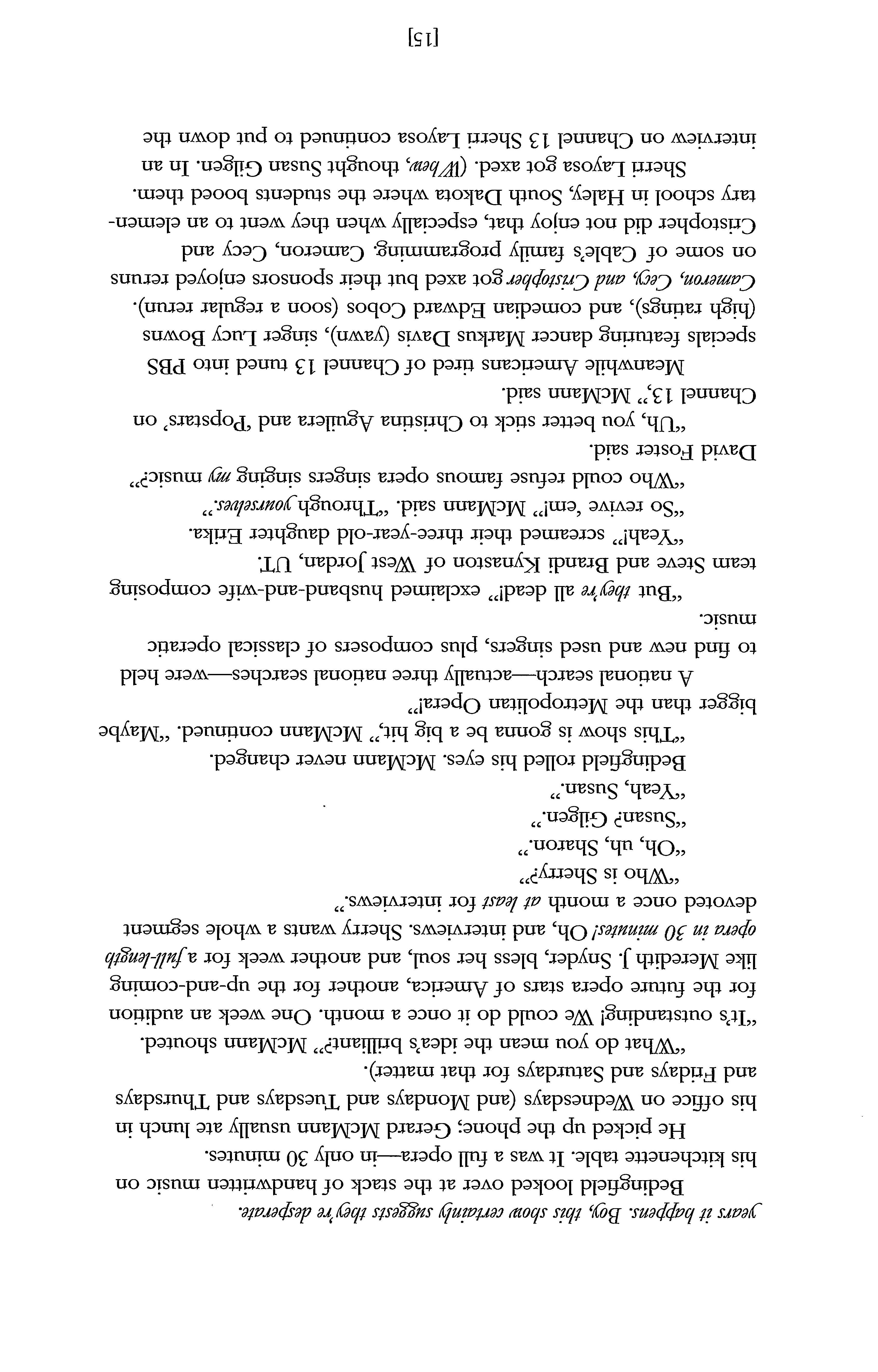
years it happens. Bqy, this show certainfy suggests thry're desperate.
Bedingfield looked over at the stack of handwritten music on his kitchenette table. It was a full opera-in only 30 minutes.
He picked up the phone; Gerard McMann usually ate lunch in his office on Wednesdays (and Mondays and Tuesdays and Thursdays and Fridays and Saturdays for that matter).
"What do you mean the idea's brilliant?" McMann shouted. "It's outstanding! We could do it once a month. One week an audition for the future opera stars of America, another for the up-and-coming like Meredith J. Snyder, bless her soul, and another week for a full-length opera in 30 minutes! Oh, and interviews. Sherry wants a whole segment devoted once a month at least for interviews."
"Who is Sherry?"
"Oh, uh, Sharon."
"Susan? Gilgen."
''Yeah, Susan."
Bedingfield rolled his eyes. McMann never changed.
"This show is gonna be a big hit," McMann continued. "Maybe bigger than the Metropolitan Opera!"
A national search-actually three national searches-were held to find new and used singers, plus composers of classical operatic music.
"But thry're all dead!" exclaimed husband-and-wife composing team Steve and Brandi Kynaston of West Jordan, UT.
''Yeah!" screamed their three-year-old daughter Erika.
"So revive 'em!" McMann said. "Throughyourselves."
''Who could refuse famous opera singers singing my music?" David Foster said.
"Uh, you better stick to Christina Aguilera and 'Popstars' on Channel 13," McMann said.
Meanwhile Americans tired of Channel 13 tuned into PBS specials featuring dancer Markus Davis (yawn), singer Lucy Bowns (high ratings), and comedian Edward Cobos (soon a regular rerun). Cameron, Cery, and Cristopher got axed but their sponsors enjoyed reruns on some of Cable's family programming. Cameron, Cecy and Cristopher did not enjoy that, especially when they went to an elementary school in Haley, South Dakota where the students booed them. Sherri Layosa got axed. (Whew, thought Susan Gilgen. In an interview on Channel 13 Sherri Layosa continued to put down the

Education Queen Gilgen publicly. And by the way, if Layosa was dressing wildly on PBS, on Channel 13 she realfy was.)
Donna Pierucci insisted on starring in the first 30-minute opera on national Tv, which the pop scene laughed at, and the first interview broadcast was with Kim Thompson of Opera in 10 Minutes, which the pop scene clamored for.
Brandi and Steve Kynaston wrote the first aired 30-minute opera because Jon Bedingfield backed out at the last minute.
Juvencio Andrade became a new host when Dominic Sawyer left to fill a role at the Met. (If he didn't it would have been taken by Billy Jensen who threatened to grow a beard just like Dominic and take all of his roles in the future.)
The African American opera star Toshiba Trimble was making a huge fuss aboµt being scared to sign on with the Met because of "social indifferance" so McMann invited her to appear on the television program. Then Toshiba appeared at the Sydd Sanford with her hair all shaved off.
Marilyn Dolloff was so excited about the TV program she quit rehearsing at the Met, gave her role to Mary Eudave, appeared on PBS, and began recording an album.
Mary Eudave was the first performer to be working outside the program and appearing on it when she performed on TV with dancer Scott Craghead. Eudave got on the show (and past McMann's offices) by parading herself as Mary Duffin.
She later got her own Special on PBS.
Craghead, by the way, was not a very good singer.
Kathleen Reid Gloeckner started writing "opericals", she called them. Pretty good for a former secretary to the Secretary of Defense.
Still no word from Bedingfield.
Nikki Adams made her dream-come-true PBS special, the first Irish lullaby singer from America, pushing Ireland's Judy Ruggles aside. Oudy Ruggles was having enough trouble with Enya and Riverdance, let alone an American Irish Folk Song singer.) Now, if you're ever in the book section of Media Play and Smash Mouth and Wallflowers are turned down low enough across the aisle, you might be able to hear Nikki occasionally.
Erinne Stephens announced in Parade magazine that she was going to do a pop album. Now she really was being compared to Charlotte Church.

Melca Armond refused to appear on some campy opera program- and later wondered why the next role she played at the Met was her last.
Cheryl Patterson was home in Tennessee dreaming of becoming the next Penelope Hall (second African American opera singer on the program- and first with hair).
Jodie Bringhurst was announcing to her family that she wanted to be the next Marilyn Dolloff someday- even though she was only eight.
Meredith J. Snyder, bless her soul, was cast as Christine Daae in The Phantom ef the Opera replacing Jayna Larsen as Rachel Wintle's Saturday m 4tinee/Wednesday night alternate. Jessica Martell was replacing Rachel Wintle, and the Phantom cast, on observing Meredith's dipsomaniacs, complained to the Palace Theater managers who rung their hands when Gerard McMann said, "I told you so."
Kristen Losee-Pace replaced Meredith Snyder.
Rachel Wintle appeared on one of those 30-minute operas.
A 19-year-old from Brigham Young University was discovered and flown to New York City to appear on the Audition and Interview segments of the show. Kristen Buck, a Sociology major and Vocal Performance minor, was being hailed as the next Lindsey l(illian. After she made her debut, Bedingfield was heard from again and so was his music.
When Kristen Buck turned down the offer to stay on with the Met and flew home to her marry her missionary, Bedingfield disappeared again.
He was heard from six years later when Aubrey Steele caught a cold, the flu, a sore throat, or otherwise something undisclosed while singing the female lead in Porgy and Bess and was immediately replaced by an unknown singer named Cheryl Patterson.
Craig Triptow

10:00-10:50
The Teacher
Kid in front
Old Guy
Ali
Kameron
The Guy that talks a lot
The Kid that reminds me of Schwisow
The Girl that twitches
Bouncer
Hot Girl
Computer Guy
The K..id with the drink
The Kid that reminds me of Isaac
Craig
Kameron is giving his presentation. Ali started looking around when he started talking. Computer Guy is sleeping. Everyone else looks like they are paying attention. Twitch Girl looks kinda bored, and the Schwisow Kid has his head down but is reading along. The Teacher is further explaining things that Kameron said. Now Kameron is answering. Twitch Girl and Schwisow Kid are talking. Old Guy looks around. Twitch Girl looks back at either me or Dr.ink Kid, and now puts her head down on back pack; she looks at Dr.ink K..id. Dr.ink Kid pulls out General Catalogue. Hot Girl is looking around, bored. Talking Guy is playing with his hands. Dr.ink Kid chewing on hood.ie string. Hot Girl writing something, probably not notes. Twitch Girl and Schwisow Kid are talking again. Isaac I<..id (next to me) is playing with his hands. Bouncer Guy puts his feet up. Talking Guy laughs at

Kameron, who is now lost. Ali & Teacher laugh at Kameron's antics. I<:id in front looks at his hands. Not as many people look like they are paying attention. The class is now discussing an ethical situation. Hot Girl looks over here, but at what I don't know. It is 10:33 am. Isaac I<:id sighs with either tiredness or boredom. Twitch Girl's head is down again, says something to class. Isaac I<:id puts his head down but is still looking forward. Schwisow looks back at me and Isaac I<:id. Drink I<:id puts away his catalogue. Twitch Girl pulls out dollar bill from back pack, probably for pretzels. Drink I<:id puts his head in hands. Schwisow's head is down, and up again, and down again. Drink I<:id pulls out U of U brochure. Computer Guy still sleeping. Hot Girl plays with hair. Ali seems to not have moved at all... Isaac I<:id looks at Hot Girl. Who in turn looks over here, neither of them saw the other. Isaac I<:id looks at Drink I<:id. Twitch Girl mutters something. Talk Guy laughs at the situation. Ali plays with nails. Teacher asks a question. Drink I<:id looks at Hot Girl. Schwisow staring at Talk Guy. Class looks at Twitch Girl while she's talking. Ali stretches her arms. Isaac I<:id looks at me. Ali puts on her coat. Drink I<:id looks at Isaac I<:id then at Hot Girl. Hot Girl plays with hair; Isaac I<:id looks at her. Class is discussing a child dying. Talk Guy debates the Teacher. Drink I<:id looks out window, then puts head down. Computer Guy still sleeping. Still debating. Twitch Girl doing something to her hands, mutters something to Schwisow. Ali plays with nails again, so does Isaac l<:id. Talk Guy looks towards door, and again. People get ready to leave (10:48). Drink I<:id plays with phone. Hot Girl slouches while listening to Teacher. It is 10:50 and the Teacher is still talking. It's past 10:50 and no sign of ending. Teacher lecturing. Kameron mutters something. Ali gets ready to leave, so does Drink l(.id. Twitch Girl says something, no one listens.
Craig writes down everything everyone does.

Frank Samuels stood behind the large picture window and watched the late night traffic pass his home on Elleston Street. It was 1:30 in the morning. His back hurt, and he was unable to sleep-again.
Frank was unable to sleep most nights. He was older than he liked to admit, seventy-three at last count, and his body was beginning to betray him. Arthritis twisted his hands into useless clumps of flesh, and his spine was decaying, rotting away, which caused him to stoop severely at the waist.
He hobbled to an ancient wood encased radio that stood against the wall, bent over and nudged the switch to on.
Outside, the street lamps dimmed and died leaving Frank alone with the yellow-green glow of his old radio. Frank Sinatra crooned a love ballad, and Frank sat in his old recliner humming the familiar tune.
"This hour in the news President Roosevelt has announced plans to push a Federal work scheme, the Civilian Conservation Corps., to beautify our nations' National Parks," a deep male voice bolted through the static of the radio. "In other news ..." Frank, who was dozing, pulled his head away from the chair and carefully listened to the breaking news.
"Roosevelt?" he said. "Must be an old news reel they're playing for the old coots." He smiled for the first time in weeks. The pain in his spine receded. He felt good. He leaned back in the recliner, took a deep breath, and closed his eyes. He didn't notice the green numbers of his clock go black.
A slight breeze tousled his straw-like hair. His skin soaked in the warmth of the dying sun. "Frank!" a familiar voice called. "Frank! Dinner is ready."
Frank opened his eyes; the sun was low on the horizon.

Children jumped and danced around him. He stumbled, falling to the hard concrete surface.
"Ha ha, Frankie fell!" shouted a blonde boy of about ten years.
Frank sat on the cold white surface of the concrete, felt his hip, and looked at his pale legs stretching out from his small brown shorts.
"Ha ha, Frankie fell!" The blonde boy shouted again. Frank looked at him, and gasped. "Eddy? Is that you?"
"Frank! Dinner is ready." The same, familiar voice shouted. "Come home now Frank."
''Your Mummy is calling, Frankie," Eddy said. His hair the color of rust, his face plastered with splotches of red freckles gave him the look of a leprechaun. It was Eddy!
Frank shook his head, jumped to his feet, and turned toward the voice. No more than a few hundred yards separated him from his mother. She made a striking figure standing in the doorway of the old clapboard house. Her long black hair pulled into a bun behind her head, hands on hips.
''Yes, I'm talking to you Frank Marlowe." Frank stumbled, regained his footing, and ran toward his mother. "Is that you Mom?"
"Silly," she said. ''Who else would I be?" Frank hugged her wildly. He looked into her deep brown eyes and could feel the heat of a tear forming in his own eye.
"I missed you Mom."
"How could you miss me?" she said with a smile. ''You've only been gone an hour Frank." She bent down and patted his hair, "But I missed you too." Her mouth curved down slightly at the corner when she smiled, just like Frank remembered. She was beautiful, tall and slender in her sturdy blue dress.
Frank stood motionless on the small porch next to his mother staring hard at her face and tried to burn the image into his mind. I will never forget how she looks. Never again, he thought.
"Are you going to come in and eat with us tonight Frank? Or-" her words were cut-off by a voice from inside the house.
''What are you two waiting for?" The voice was deep and male.
"Daddy? Is that Daddy?" Frank said. His voice trembled.
"Of course Daddy's here," his mother said, a scowl of concern on her face. ''Are you all right Frank?" She brushed his hair
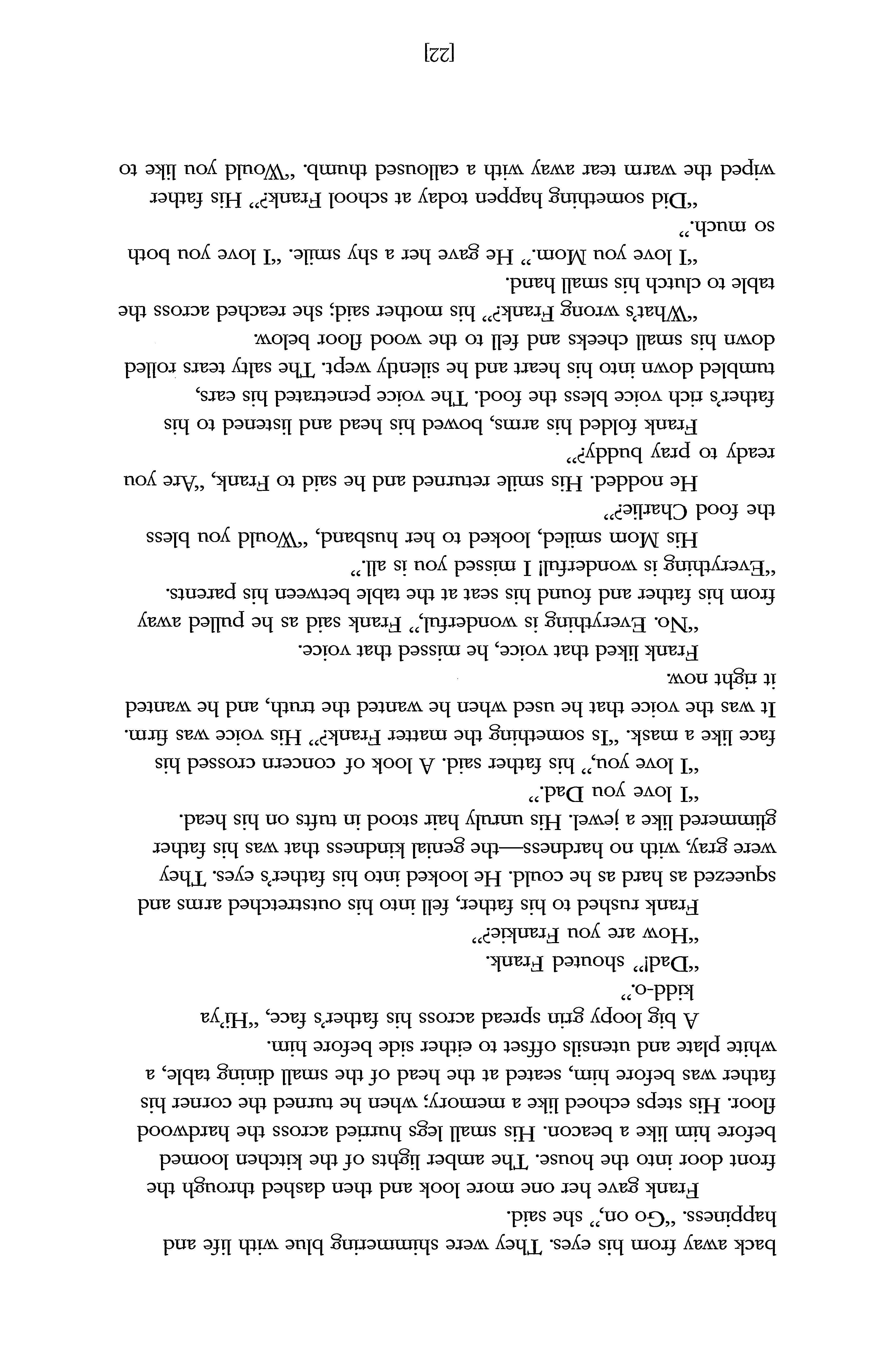
back away from his eyes. They were shimmering blue with life and happiness. "Go on," she said.
Frank gave her one more look and then dashed through the front door into the house. The amber lights of the kitchen loomed before him like a beacon. His small legs hurried across the hardwood floor. His steps echoed like a memory; when he turned the corner his father was before him, seated at the head of the small dining table, a white plate and utensils offset to either side before him.
A big loopy grin spread across his father's face, "Hi'ya kidd-o."
"Dad!" shouted Frank.
"How are you Frankie?"
Frank rushed to his father, fell into his outstretched arms and squeezed as hard as he could. He looked into his father's eyes. They were gray, with no hardness-the genial kindness that was his father glimmered like a jewel. His unruly hair stood in tufts on his head.
"I love you Dad."
"I love you," his father said. A look of concern crossed his face like a mask. "Is something the matter Frank?" His voice was firm. It was the voice that he used when he wanted the truth, and he wanted it right now.
Frank liked that voice, he missed that voice.
"No. Everything is wonderful," Frank said as he pulled away from his father and found his seat at the table between his parents. "Everything is wonderful! I missed you is all."
His Mom smiled, looked to her husband, ''Would you bless the food Charlie?"
He nodded. His smile returned and he said to Frank, ''Are you ready to pray buddy?"
Frank folded his arms, bowed his head and listened to his father's rich voice bless the food. The voice penetrated his ears, tumbled down into his heart and he silently wept. The salty tears rolled down his small cheeks and fell to the wood floor below.
''What's wrong Frank?" his mother said; she reached across the table to dutch his small hand.
"I love you Mom." He gave her a shy smile. "I love you both so much."
"Did something happen today at school Frank?" His father wiped the warm tear away with a calloused thumb. ''Would you like to

tell us?"
Frank looked at him; tears glistened at the corners of his eyes. "I love you Daddy."
His mother squeezed his hand. ''We love you too, Frank." She silenced his father's next question with a quick look and continued, "Let's eat and enjoy each other during dinner. Then, if something is bothering you Frank, we can talk about it." She placed a pork-chop, a pile of mashed potatoes with fragrant brown gravy, and a small pool of bright green peas on Frank's plate.
He leaned over his food and pulled the aroma into his nose and smiled. It was all so familiar. It was all so real. He heaped his fork with pork-chop and potato, and pushed the mass into his mouth. Frank turned to his mother, chewing his food, and whispered, "I missed you Mom."
"I know baby, I missed you too." When the meal was finished Frank's father excused himself. He gave the excuse of unfinished work and disappeared into his small office.
Frank's mother turned to him and said, "Do you have homework tonight?"
Frank hesitated, stuttered, "Umm, I don't think so."
"No reading?"
''Would you read to me Mom?" Frank said quickly.
His mother smiled, tickled his ribs and said, ''What would you like to read?"
"Something scary!" he said excitedly.
"Scary, like what?"
"Umm maybe, Doc Savage?" He regretted it the moment he spoke the words. His mother didn't approve of those books. They were beneath him. "Or, maybe you know something," he said quickly.
"I think I do know something you, and I, would both like," she said. "I'll be right back." She walked out of the kitchen and into the small living room where the bookshelf stood, removed a slim volume, and returned to the kitchen.
''What is it Mommy?" Frank asked; his voice was warm with excitement.
"I thought we could read 'The Raven' by Edgar Allen Poe." She showed him the book-its black binding caught the kitchen light. "Go change into your pajamas and I'll be up in a few minutes."
Frank rushed up the stairs two steps at a time and pushed
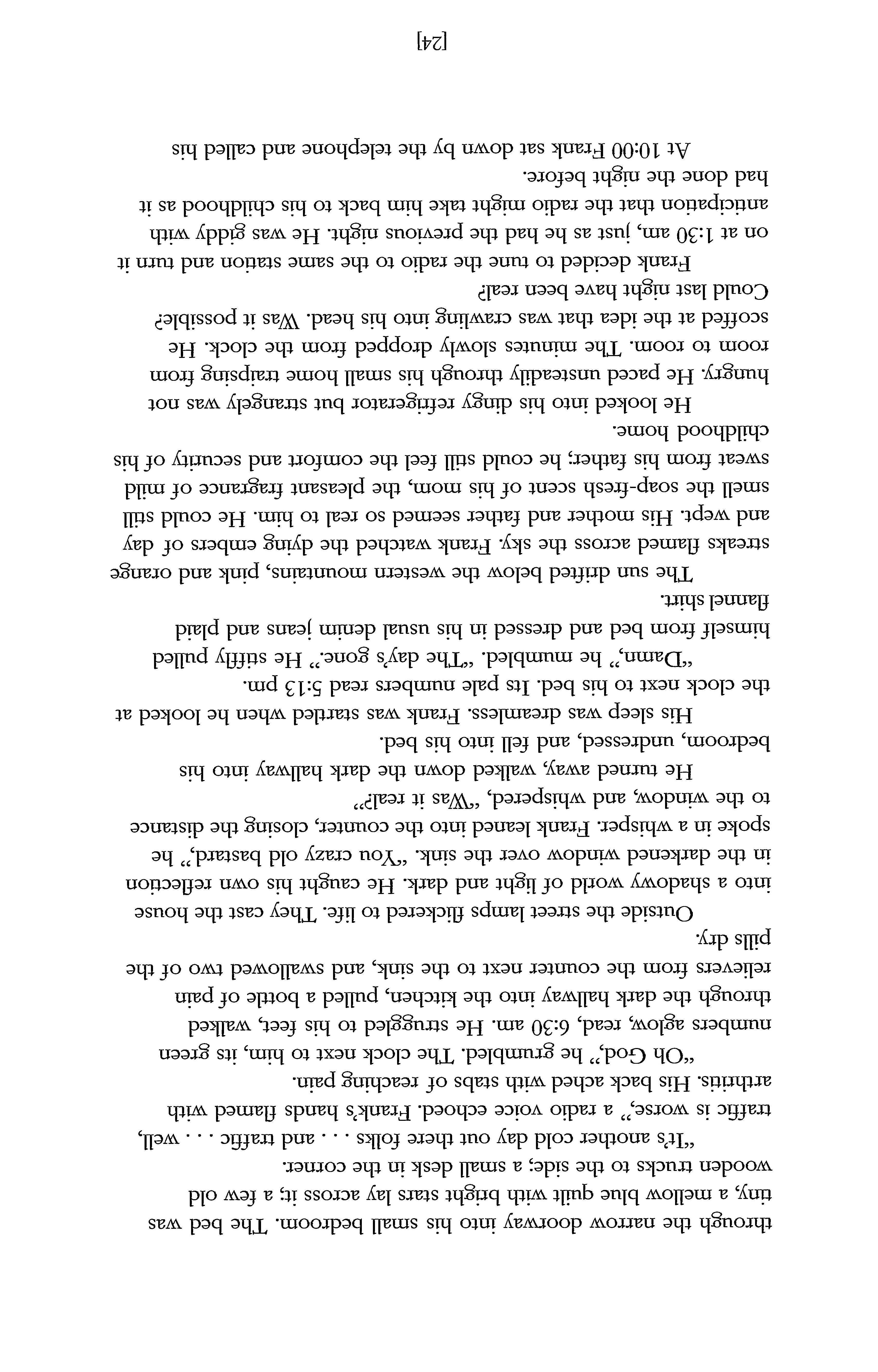
through the narrow doorway into his small bedroom. The bed was tiny, a mellow blue quilt with bright stars lay across it; a few old wooden trucks to the side; a small desk in the corner.
"It's another cold day out there folks ... and traffic ... well, traffic is worse," a radio voice echoed. Frank's hands flamed with arthritis. His back ached with stabs of reaching pain.
"Oh God," he grumbled. The clock next to him, its green numbers aglow, read, 6:30 am. He struggled to his feet, walked through the dark hallway into the kitchen, pulled a bottle of pain relievers from the counter next to the sink, and swallowed two of the pills dry.
Outside the street lamps flickered to life. They cast the house into a shadowy world of light and dark. He caught his own reflection in the darkened window over the sink. ''You crazy old bastard," he spoke in a whisper. Frank leaned into the counter, closing the distance to the window, and whispered, ''Was it real?"
He turned away, walked down the dark hallway into his bedroom, undressed, and fell into his bed.
His sleep was dreamless. Frank was startled when he looked at the clock next to his bed. Its pale numbers read 5:13 pm.
"Damn," he mumbled. "The day's gone." He stiffly pulled himself from bed and dressed in his usual denim jeans and plaid flannel shirt.
The sun drifted below the western mountains, pink and orange streaks flamed across the sky. Frank watched the dying embers of day and wept. His mother and father seemed so real to him. He could still smell the soap-fresh scent of his mom, the pleasant fragrance of mild sweat from his father; he could still feel the comfort and security of his childhood home.
He looked into his dingy refrigerator but strangely was not hungry. He paced unsteadily through his small home traipsing from room to room. The minutes slowly dropped from the clock. He scoffed at the idea that was crawling into his head. Was it possible? Could last night have been real?
Frank decided to tune the radio to the same station and turn it on at 1:30 am, just as he had the previous night. He was giddy with anticipation that the radio might take him back to his childhood as it had done the night before.
At 10:00 Frank sat down by the telephone and called his

daughter. "Hi Nancy," he said when she answered.
"Dad? \Xlhat are you doing up so late?" she said.
Frank didn't tell his daughter that he had trouble sleeping. "I slept late this morning, and now I can't sleep." Frank chuckled. "I feel like a lazy kid."
Nancy laughed. "I can't remember the last time you slept late Dad. \Xlhen did you wake?"
"Late," he fumbled for words. "Nance, I saw my mom and dad last night."
"You saw them? You mean you dreamed about them?"
"No. Yes-I mean, I don't know," he trailed off.
Nancy slowly pulled the story from him. He even told her about his plan to test the radio.
"Dad, that's crazy," said Nancy. ''Are you sure you're alright?"
"I'm old Nancy, and lonely God knows, but I'm okay girl." His voice was tight and weary.
Nancy choked back a sob. "I'll come over tomorrow Daddy. I'll bring some lunch," then, "I think you should go to bed Daddy and I'll come by tomorrow."
Frank agreed, but long after the phone was in its cradle he sat in the old recliner and watched the green numbers of his clock scroll to 1:30 am.
He scurried to the radio, flipped the switch and the lyrical voice of Frank Sinatra hummed from the large round speaker. It was the same song. Outside, the street lamps dimmed, then disappeared. The harsh glow of his electric clock vanished and Frank was left with only the ancient yellow-green glow of the old radio. A slight breeze tugged at Frank's ragged white hair. He closed his eyes and listened to the last notes of the song.
"The time is 1:30, and you're listening to KJBN broadcasting from Salt Lake City, Utah ... In the news ... President Eisenhower announced today that he will implement the Marshall Plan to rebuild Germany and other European nations that were the hardest hit by the World War," the radio hissed.
"Frank." The voice was female. It was followed shortly by a gentle push to his shoulder. He opened his eyes, abandoning pleasant sleep, and looked into the smiling face of his wife.
"Frank." Her smile brightened. ''You've slept in again."
"Marilyn?" gasped Frank. He sat up quickly and pulled her to [25]
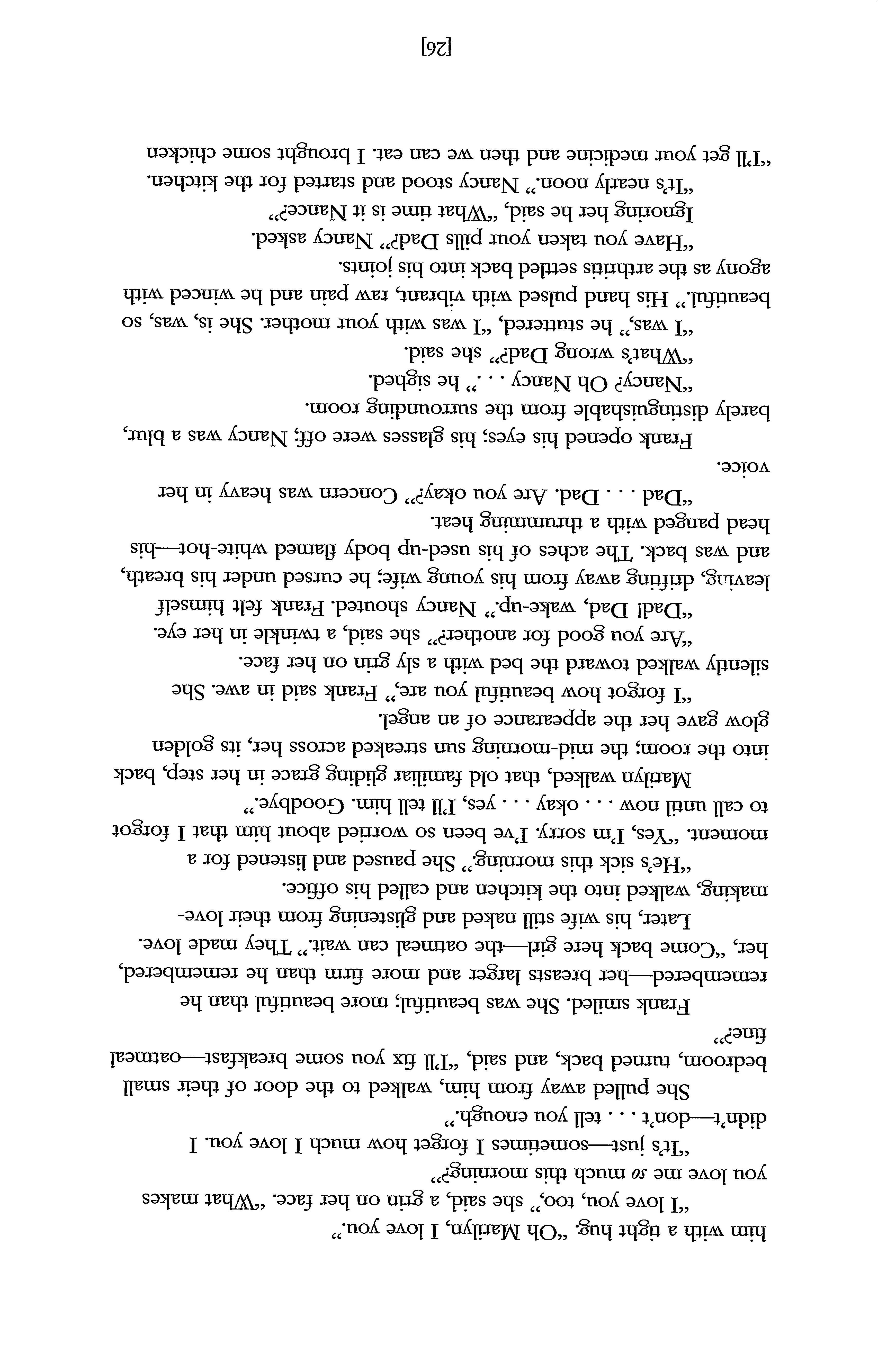
him with a tight hug. "Oh Marilyn, I love you."
"I love you, too," she said, a grin on her face. "What makes you love me so much this morning?"
"It's just-sometimes I forget how much I love you. I didn't-don't ... tell you enough."
She pulled away from him, walked to the door of their small bedroom, turned back, and said, "I'll fix you some breakfast-oatmeal fine?"
Frank smiled. She was beautiful; more beautiful than he remembered-her breasts larger and more firm than he remembered, her, "Come back here girl-the oatmeal can wait." They made love.
Later, his wife still naked and glistening from their lovemaking, walked into the kitchen and called his office.
"He's sick this morning." She paused and listened for a moment. ''Yes, I'm sorry. I've been so worried about him that I forgot to call until now ... okay . . . yes, I'll tell him. Goodbye."
Marilyn walked, that old familiar gliding grace in her step, back into the room; the mid-morning sun streaked across her, its golden glow gave her the appearance of an angel.
"I forgot how beautiful you are," Frank said in awe. She silently walked toward the bed with a sly grin on her face.
''Are you good for another?" she said, a twinkle in her eye.
"Dad! Dad, wake-up." Nancy shouted. Frank felt himself leaving, drifting away from his young wife; he cursed under his breath, and was back. The aches of his used-up body flamed white-hot-his head panged with a thrumming heat.
"Dad Dad. fue you okay?" Concern was heavy in her voice.
Frank opened his eyes; his glasses were off; Nancy was a blur, barely distinguishable from the surrounding room.
"Nancy? Oh Nancy ..." he sighed.
"What's wrong Dad?" she said.
"I was," he stuttered, "I was with your mother. She is, was, so beautiful." His hand pulsed with vibrant, raw pain and he winced with agony as the arthritis settled back into his joints.
"Have you taken your pills Dad?" Nancy asked.
Ignoring her he said, ''What time is it Nance?"
"It's nearly noon." Nancy stood and started for the kitchen. "I'll get your medicine and then we can eat. I brought some chicken [26]

and pasta I picked up at the market."
Frank smiled. He looked at his daughter. ''You look like her Nance. You look so much like your mother."
The shadow of a smile crossed her face. ''You've told me Daddy."
Frank sank deeper into his recliner, and Nancy went to the kitchen. The two ate in silence. Nancy stayed through the afternoon and left at six.
"If you need anything call me Dad," she paused, looked at him hard and said, "I'm worried about you."
"I'm okay Nanc, just getting old is all." He gave her a smile and watched her to her car.
When she was gone he went to bed and collapsed into sleep. He awoke at midnight to the shrill sound of his alarm. He ate and made preparations for the 1:30 radio tour. He turned on the radio and was greeted by the deep voice of Frank Sinatra. Frank walked to the recliner, sat down and tumbled into his past.
Frank was eighteen, serving in the Pacific during World War 11. The smell of rot and decay enveloped him; smoke drifted over the tree-infested hill; explosions erupted in all directions clanging his ears with merciless force. He thought about Nancy, his future, the ancient body he would return to, and for a moment hoped he would die on this rugged faraway island, but in the end he returned.
His return was later than the previous two; it was nearly 4:00 in the afternoon. Over the next several weeks he waited for the proper hour and drifted into his past through the old radio. His journey was always longer and more pleasurable than the last. He jumped in and out of his life with ease, and learned he could control how long any particular trip was.
Then one cold February night, Valentine's Day, he found what he was looking for. The radio played Sinatra. The street lamps dimmed, then were gone, the green light of the clock went black and he was on a beach. He looked around, the images began to mesh ...
It was Florida; his honeymoon. A gentle breeze scurried off the Gulf of Mexico and tugged his hair. Marilyn wore a blue onepiece bathing suit that covered her well, but emphasized the provocative curves of her hips, her flat stomach and the gentle rise of her breasts.
She was perfect.
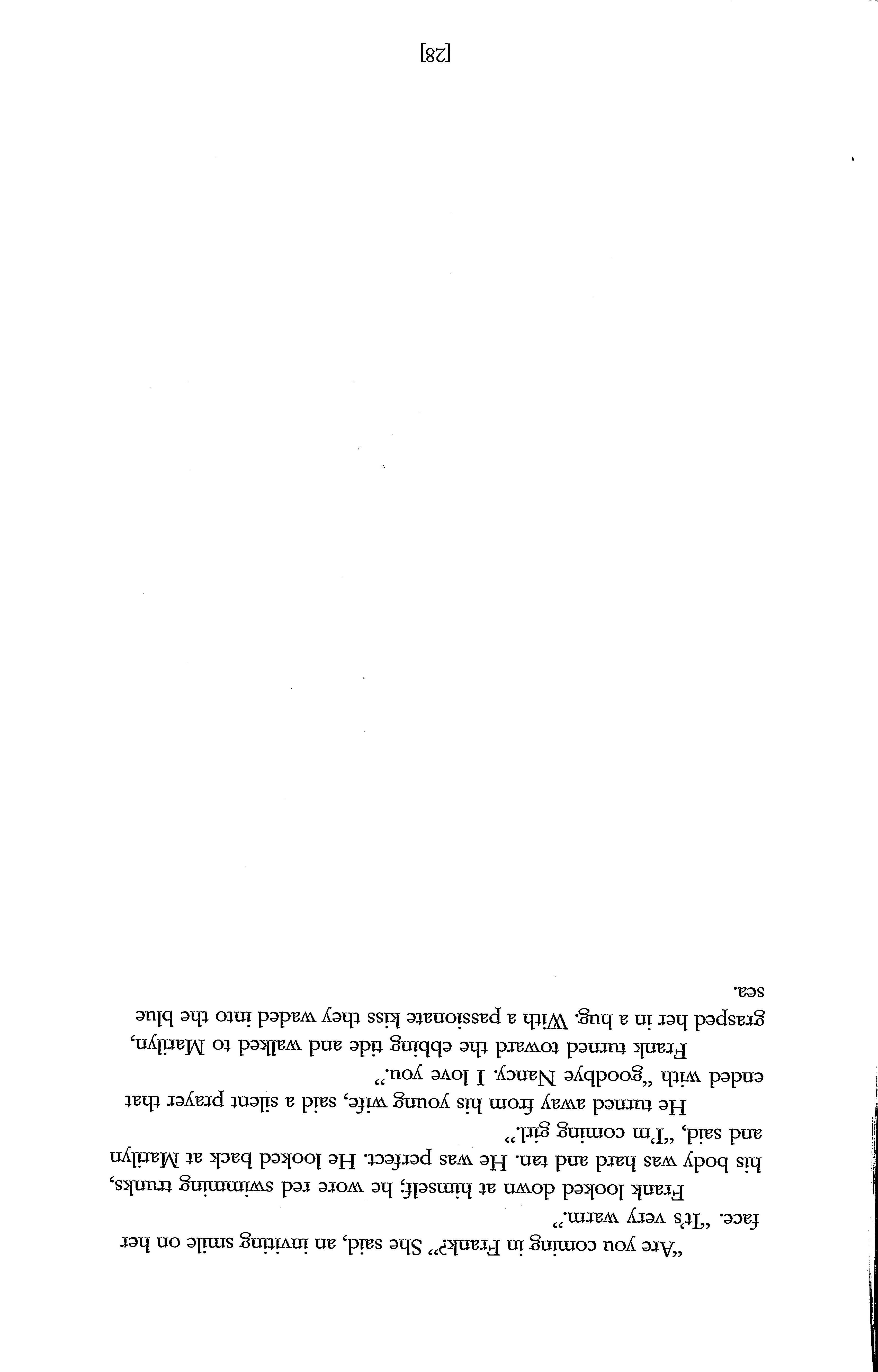
''Are you coming in Frank?" She said, an inviting smile on her face. "It's very warm."
Frank looked down at himself; he wore red swimming trunks, his body was hard and tan. He was perfect. He looked back at Marilyn and said, "I'm coming girl."
He turned away from his young wife, said a silent prayer that ended with "goodbye Nancy. I love you."
Frank turned toward the ebbing tide and walked to Marilyn, grasped her in a hug. With a passionate kiss they waded into the blue sea.


listen up because Night is by no means young, as she sits in the cradle of her alias: Metatron
and your tongue blackened by soils of deceit your spirit broken by tails of defeat praying to Isis and angels alike, for healing release from feeling and then sealing your fate
this Night is not young but ageless, in love with your imperfections and you
in love with her testaments of timelessness
healing will not come Night will not die and broken hearts can no longer cry for daylight has come to them
reborn in flames and fate and Night will heal
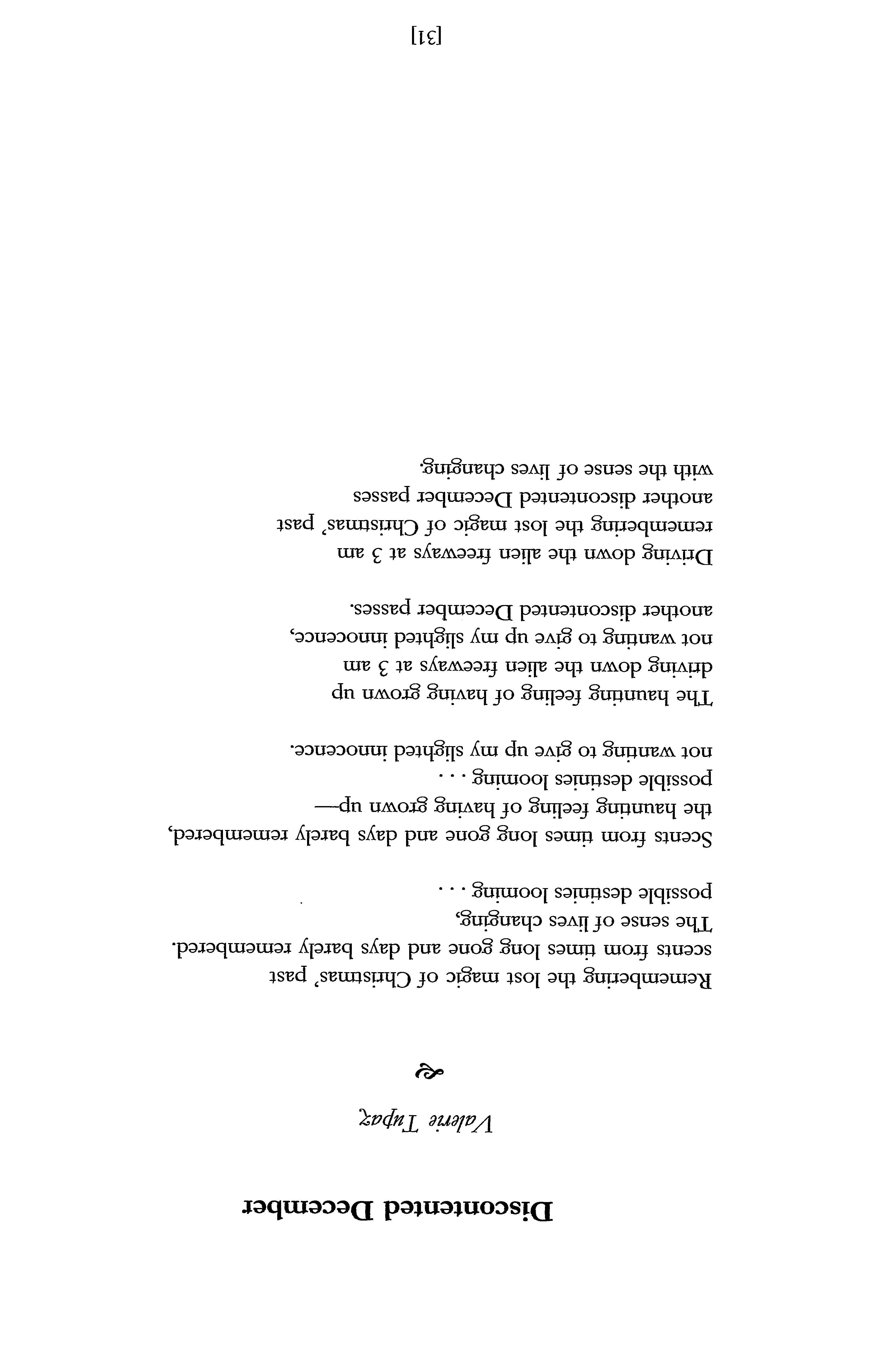
Remembering the lost magic of Christmas' past scents from times long gone and days barely remembered. The sense of lives changing, possible destinies looming . . .
Scents from times long gone and days barely remembered, the haunting feeling of having grown uppossible destinies looming not wanting to give up my slighted innocence.
The haunting feeling of having grown up driving down the alien freeways at 3 am not wanting to give up my slighted innocence, another discontented December passes.
Driving down the alien freeways at 3 am remembering the lost magic of Christmas' past another discontented December passes with the sense of lives changing.

I can't write fast enough, it's not about me dear Muse has made a home today and I'm more than ok I'll write til I scratch this paper to fire til my pen wears dry til my hand, arm, knuckles, muscles cramp hair triggered most often coupled dear words lovely words keep flowing down my unworthy arms silly scribbles keep lighting, so profound, my way to revolutions

Is it the rich at heart?
Who find their niche, their part
The world's too fast for the slow
There for the rich give a tow
No matter friend or foe
Is it all about his start?
That life influenced on his heart
So he plays his part
Down a one way track on a hand cart
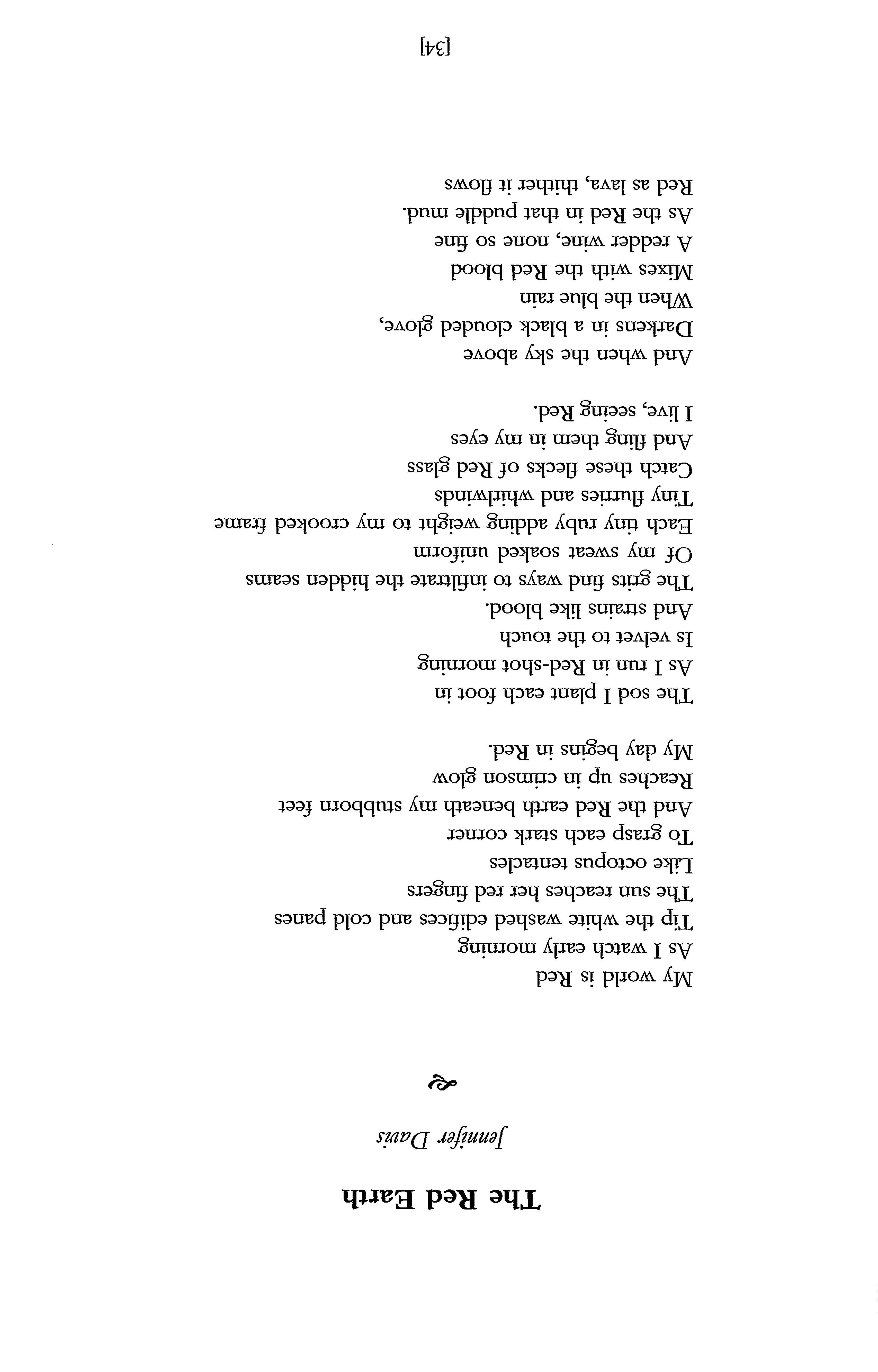
My world is Red
As I watch early morning
Tip the white washed edifices and cold panes
The sun reaches her red fingers
Llke octopus tentacles
To grasp each stark corner
And the Red earth beneath my stubborn feet
Reaches up in crimson glow
My day begins in Red.
The sod I plant each foot in
As I run in Red-shot morning
Is velvet to the touch
And strains like blood.
The grits find ways to infiltrate the hidden seams
Of my sweat soaked uniform
Each tiny ruby adding weight to my crooked frame
Tiny flurries and whirlwinds
Catch these flecks of Red glass
And fling them in my eyes
I live, seeing Red.
And when the sky above
Darkens in a black clouded glove, When the blue rain
Mixes with the Red blood
A redder wine, none so fine
As the Red in that puddle mud.
Red as lava, thither it flows

And reddens white snows. The Red wash grows.
Was ruled in brown and yellow
Now in my eye, no color seen
As much as the bloody stream
Of berry Red shrine
All Georgia knows is Red.
For beneath the carpet of thickened green Lles the crimson gleam
Of the Red Earth.
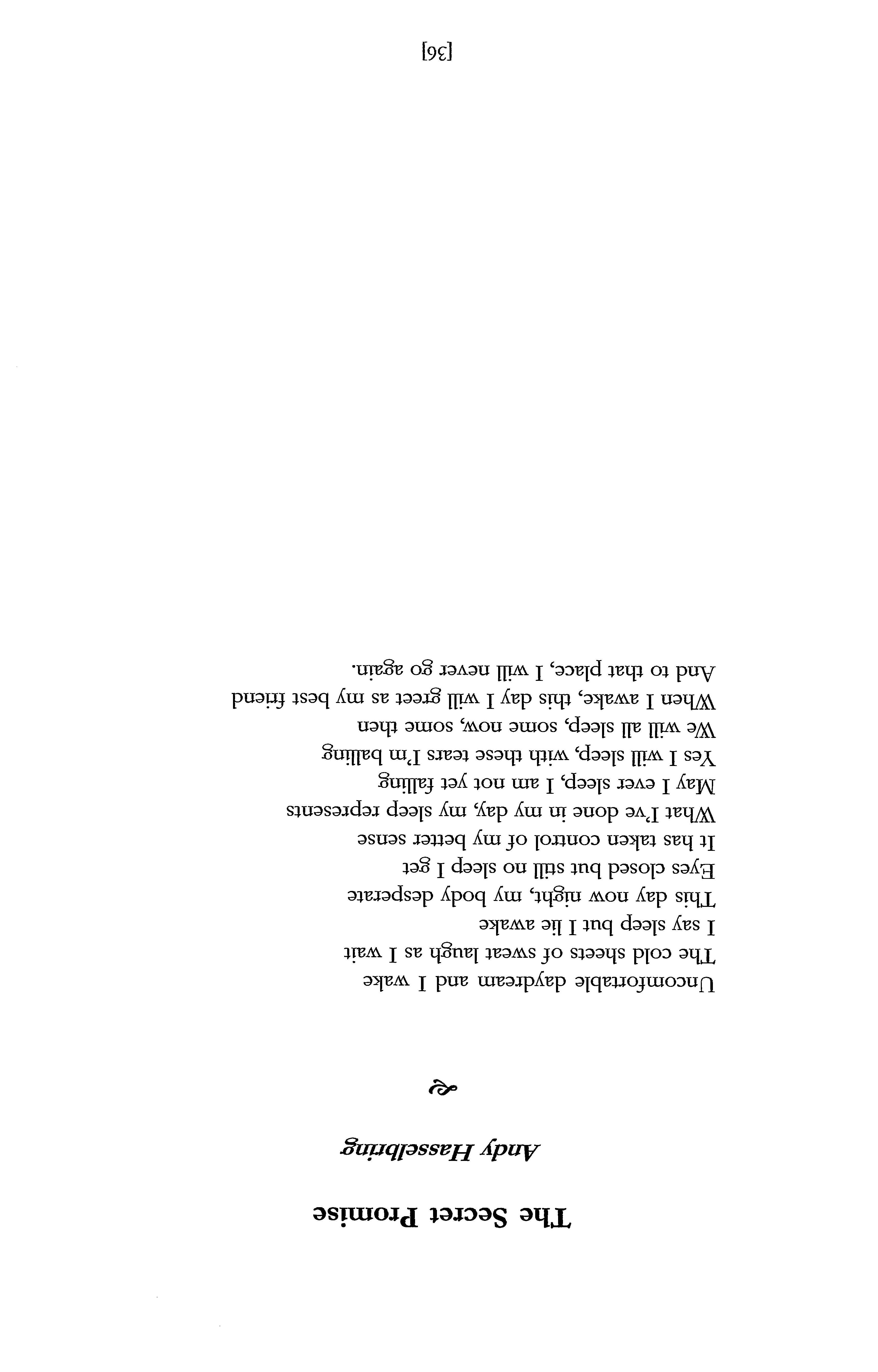
Uncomfortable daydream and I wake
The cold sheets of sweat laugh as I wait I say sleep but I lie awake
This day now night, my body desperate
Eyes closed but still no sleep I get
It has taken control of my better sense
What I've done in my day, my sleep represents
May I ever sleep, I am not yet falling
Yes I will sleep, with these tears I'm balling
We will all sleep, some now, some then
When I awake, this day I will greet as my best friend
And to that place, I will never go again.

We had been driving down State Street. Her blue eyes held more pain than any shouldcaged by premature wrinkles. She married and divorced, young. Lived on both coasts, spent foolish years on drugs and in prison was forced to give up. At this late date She fights the stigma of "old dog" sayings. Deprived of pigtails and pony rides, she smiles sadly moves on. She builds her new life swimming against the currents of expectation. She's taken the many roads to this old point. She tells me about these regrets and this new beginning as we drive down State Street.

I.
Cause and effect deserve all accolades for those exhilarating moments that we share together. Shirking our less satisfying obligations, we conduct our raids upon impersonal reciprocities by merging will with will, force with force until our union builds a cogent source of strength from our commingled energies.
Who could resist our potent juggernaut of yoked directed strategies? Who our burning bold, and slashing tactics? Who discern objectives not our own? A fray well fought but doomed to fall before empiric laws, heady effect of insufficient cause.
II.
However much I'd hoped, however thought pursuit might lead to ultimate fruition, our circumstance inhibits our condition from further progress. Weak and overwrought with doubt, I cannot fully satisfy suspicions an advance could tear a breach in the relationship we've strove to reach that forms this vital throbbing synergy.
The tension muddles all I do, and yet I'm paralyzed and numbed by self-reproach.
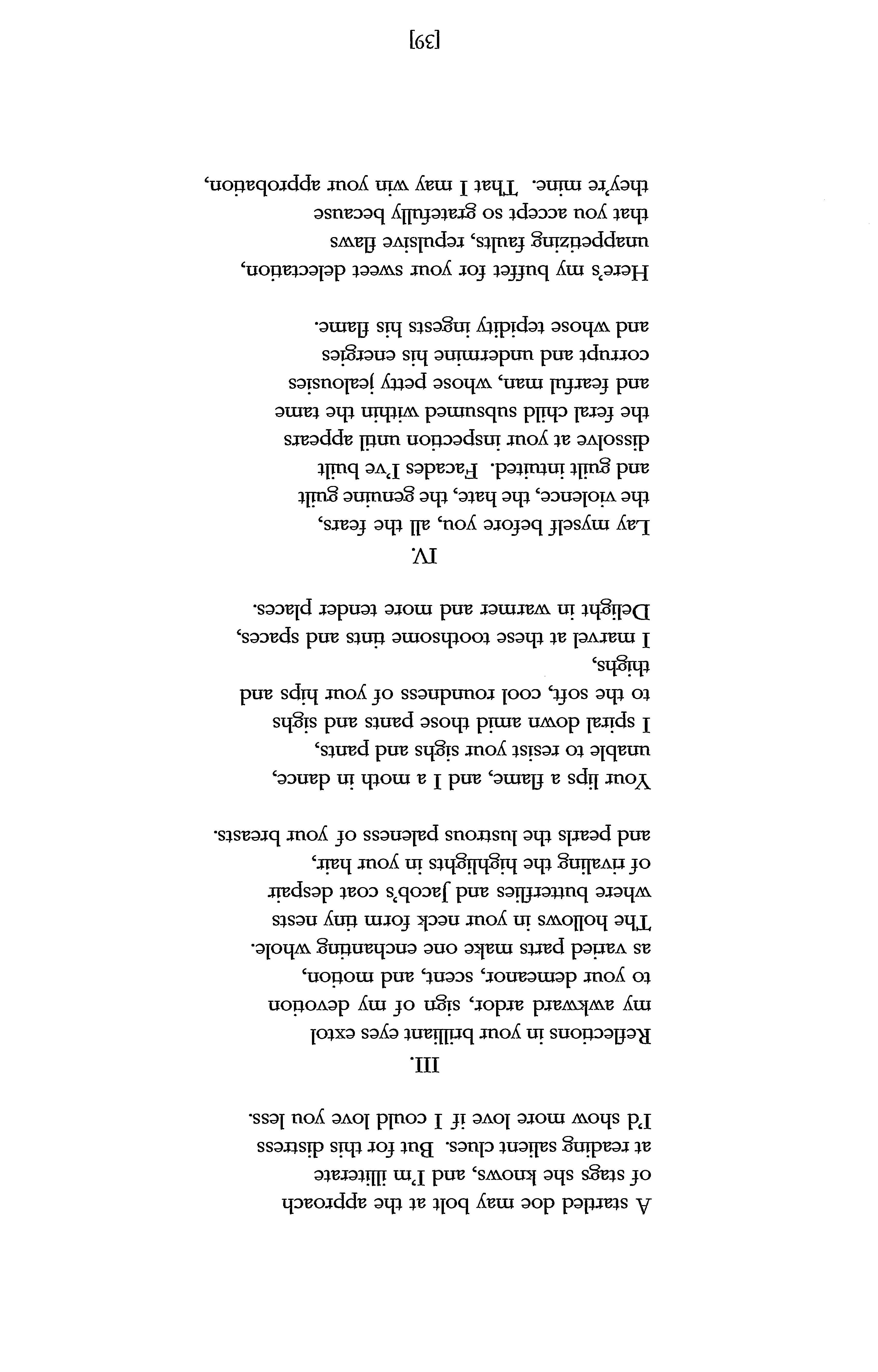
A startled doe may bolt at the approach of stags she knows, and I'm illiterate at reading salient clues. But for this distress I'd show more love if I could love you less.
III.
Reflections in your brilliant eyes extol my awkward ardor, sign of my devotion to your demeanor, scent, and motion, as varied parts make one enchanting whole. The hollows in your neck form tiny nests where butterflies and Jacob's coat despair of rivaling the highlights in your hair, and pearls the lustrous paleness of your breasts.
Your lips a flame, and I a moth in dance, unable to resist your sighs and pants, I spiral down amid those pants and sighs to the soft, cool roundness of your hips and thighs,
I marvel at these toothsome tints and spaces, Delight in warmer and more tender places.
N.
Lay myself before you, all the fears, the violence, the hate, the genuine guilt and guilt intuited. Facades I've built dissolve at your inspection until appears the feral child subsumed within the tame and fearful man, whose petty jealousies corrupt and undermine his energies and whose tepidity ingests his flame.
Here's my buffet for your sweet delectation, unappetizing faults, repulsive flaws that you accept so gratefully because they're mine. That I may win your approbation,

I lay before your every thought and act and trust you'll leave my poor selfhood intact.
VSerenity permits mature reflection on reconciling opposites. Your fine, soft hair, the glory of this head reclining on my shoulder, defies connection with your determination's flinty rage to domineer; your pale and naked chest belies your vigor, your inflamed unrest to overwhelm the impediments of the age.
Your neatly folded silks and laces mock my crumpled tweeds and broadcloth on the floor.
My rigor makes my passive drifting intransigent to you; I cannot lock my fire within, uncertainty without, or reconcile my longing with my doubt.
VI.
The time I spend alone is intermission to tender scenes that we've agreed to play. I pace in costume, rehearsing what I'll say, inventing lines with more wit, more precision. And eager for the curtain's rise, I bristle to begin my role, the keen, beguiling instants as graceful as a cobra's sinuous dance, as piercing as a satyr's luring whistle.
And yet I know my lines will not be heard above the hoots and catcalls of the crowd, my gestures turned to grimaces, my proud, true steps will stagger, my voice will be absurd. I fall and flail when all eyes are upon us,
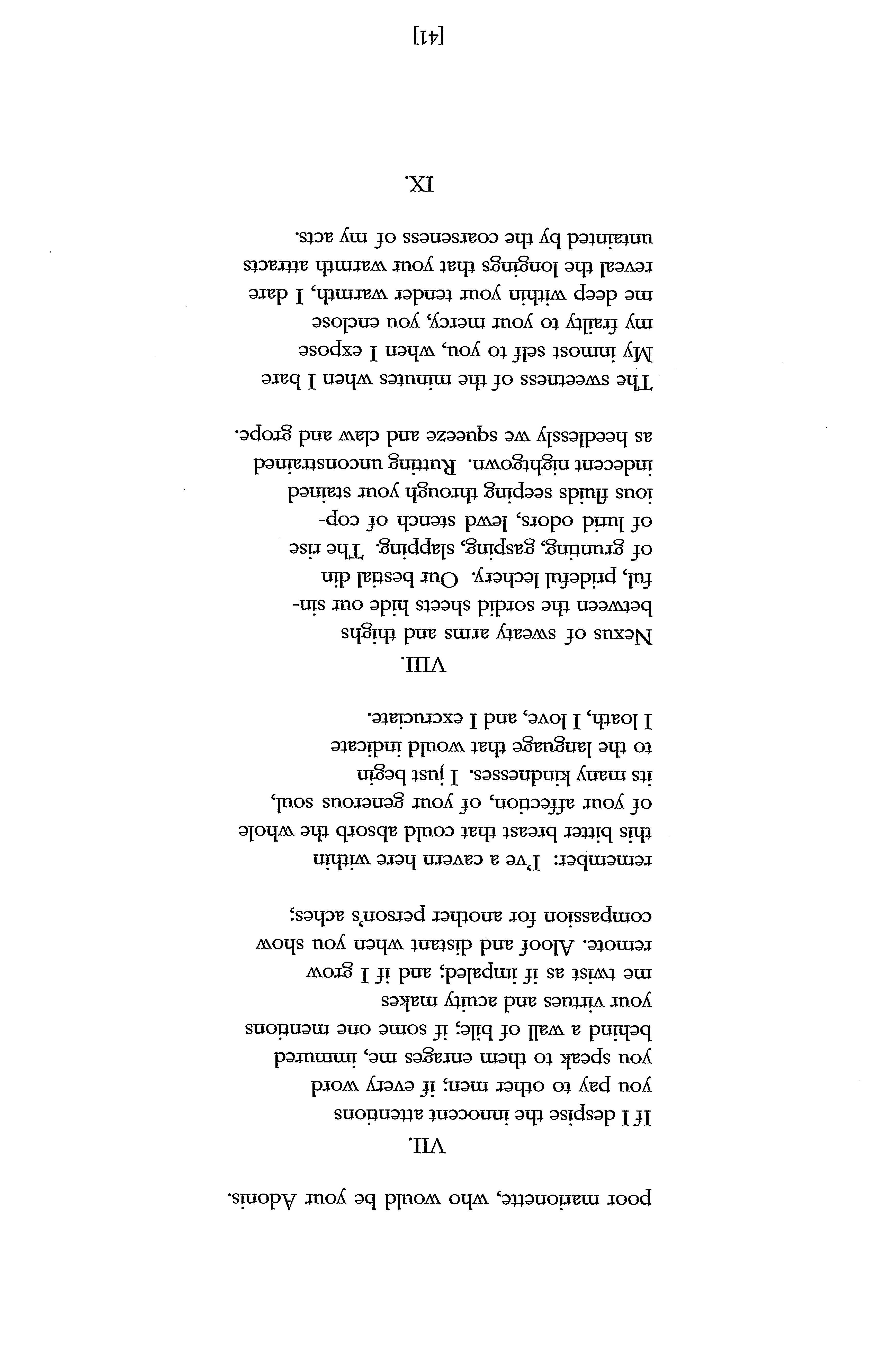
poor marionette, who would be your Adonis.
VII.
If I despise the innocent attentions you pay to other men; if every word you speak to them enrages me, immured behind a wall of bile; if some one mentions your virtues and acuity makes me twist as if impaled; and if I grow remote. Aloof and distant when you show compassion for another person's aches;
remember: I've a cavern here within this bitter breast that could absorb the whole of your affection, of your generous soul, its many kindnesses. I just begin to the language that would indicate I loath, I love, and I excruciate.
VIII.
Nexus of sweaty arms and thighs between the sordid sheets hide our sinful, prideful lechery. Our bestial din of grunting, gasping, slapping. The rise of lurid odors, lewd stench of copious fluids seeping through your stained indecent nightgown. Rutting unconstrained as heedlessly we squeeze and claw and grope.
The sweetness of the minutes when I bare My inmost self to you, when I expose my frailty to your mercy, you enclose me deep within your tender warmth, I dare reveal the longings that your warmth attracts untainted by the coarseness of my acts.
IX.

Excite me, awe me, shape me into one whose image rivals yours. Arouse me, infuse me with the ancient wisdom that you use so lightly, like the luminescent sun its soft corona. Teach me empathy and lead me in your ways of tenderness and grace, direct me to the effortless paths that you walk with magnanimity.
No. Break me down and lacerate me, then construct from all those lumpish parts of mine a self-sufficient equal; recombine malignant fractions into the best of men and render me, to cast a man complete and worthy where your disparate vectors meet.
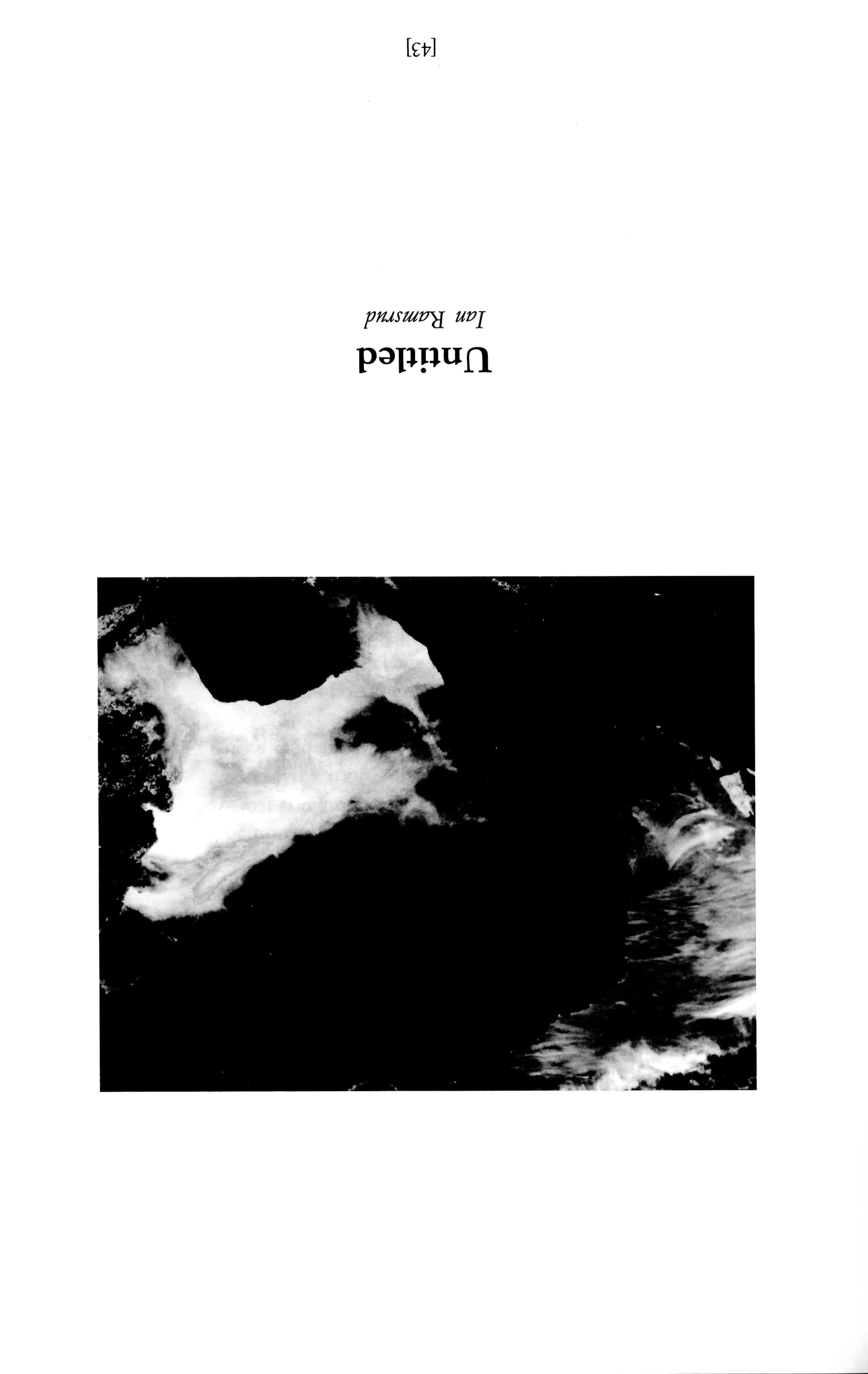

I want to sing a melody
A sweet and simple hymn
One to harmonize with nature And compliment the moon
The notes you cannot follow; As lost you are in them, Can crush a thousand pounds of lead Into a diadem
Its' coursing power caught the wise Meshed airiness defeats you
Streams of fire beat the breeze
Rattling trees swipe rhythm
Whispering winds are caught up here
Between my barefoot toes
Screaming out a descant; The song is born and grows!
Swaying like a habit
I see my wish and grab it
But when I peer inside my soul
To see if it has caught a hold
I find that it has slithered out
An old and unused spout
Black as midnight
And cool as dolphin's skin

I stalk the ending of my notes
And place before it my discipline
I have no score of gems
No list of read-off cues
I'll sing what e'er is given me
To build the requiem
Softly spoken
I have awoken
The sleeping distant drum
Which mixes deep within
Lullaby and concert suite
You cannot place the tune
But there's something there you can't forget
An ancient sacred rune
And as I see sun's rays reflect The alto that I sing
Her light and lilting sunset
Adds distance to my praising
I place completed masterpiece
Upon the world at large
And hope to catch the crystal tear
That falls between your eyes
And kiss forth the wings ofyour song!

Tall, dark and rich I sit, beckoning you tempting you you know you want me why else would you have asked for me? That's it Smell me. I promise, if you taste me it'll be savory oh so you like whipped cream on top! I like Well, go on I'm waiting. Mmm yes
Aren't I good? Yeah ... that's it ... Drain me ... What? No time to stay for dessert?
That's okay, You know you'll be back, on another mocha morning.

I live a funny dream, and dream a better one tomorrow the pictures stripped down may no longer be pitiful if only I could capture these embitterment feelings if only I could demand more attention with presence, rather than a miniskirt
I live nightmarishly, dreaming I could actually breathe today is tomorrow and the next is a surprise weeks since the break-up and footprints on my hand went for daring once, now I just dress for the weather

Once professional dreamers of fictional hopes, Now just lost in dreamlands, Even there we can feel no happy endings. Multi-talented, or not at all, Men of periphery and knowledge, Or constant confusion, never really sure about anything, Mostly just assumptions and guesses, ... I make it through the night.
We find it is hard to be honest all of the time, Only feelings are honest, I trust only them.
Every sense deceives, thoughts wander through brick and ivy mazes, Emotions remain unstable, Yet honest,
I thought she knew about honest and true feelings. However there are theories now, She was trying to break my heart, Dispatched her "boys in blue," Called it her liberation even, Well, at least in theory.
We have welcomed any others in like lovers and I'm afraid I've met her equal.
It begins and ends again
I'm such an addict to the same things day after day.

Sadly and pathetically comical ...
Haven't really ... in weeks.
Remember that night,
That one night we had, I didn't have the nerve to console you
To ease your pitied feelings We both felt it, It itself felt it.
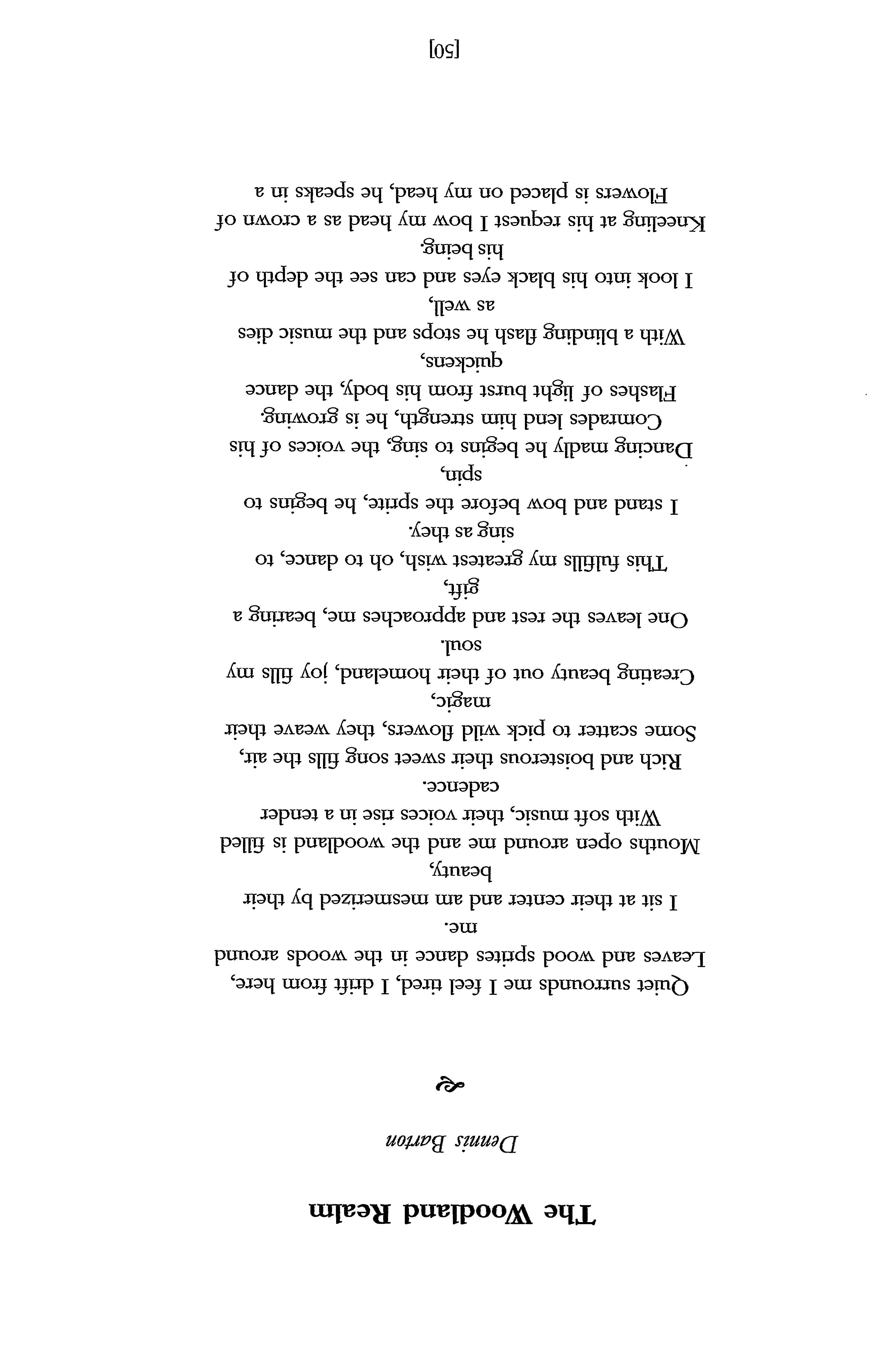
Quiet surrounds me I feel tired, I drift from here, Leaves and wood sprites dance in the woods around me.
I sit at their center and am mesmerized by their beauty,
Mouths open around me and the woodland is filled With soft music, their voices rise in a tender cadence.
Rich and boisterous their sweet song fills the air, Some scatter to pick wild flowers, they weave their magic,
Creating beauty out of their homeland, joy fills my soul.
One leaves the rest and approaches me, bearing a gift, This fulfills my greatest wish, oh to dance, to sing as they.
I stand and bow before the sprite, he begins to spin,
Dancing madly he begins to sing, the voices of his Comrades lend him strength, he is growing. Flashes of light burst from his body, the dance quickens, With a blinding flash he stops and the music dies as well,
I look into his black eyes and can see the depth of his being.
Kneeling at his request I bow my head as a crown of Flowers is placed on my head, he speaks in a
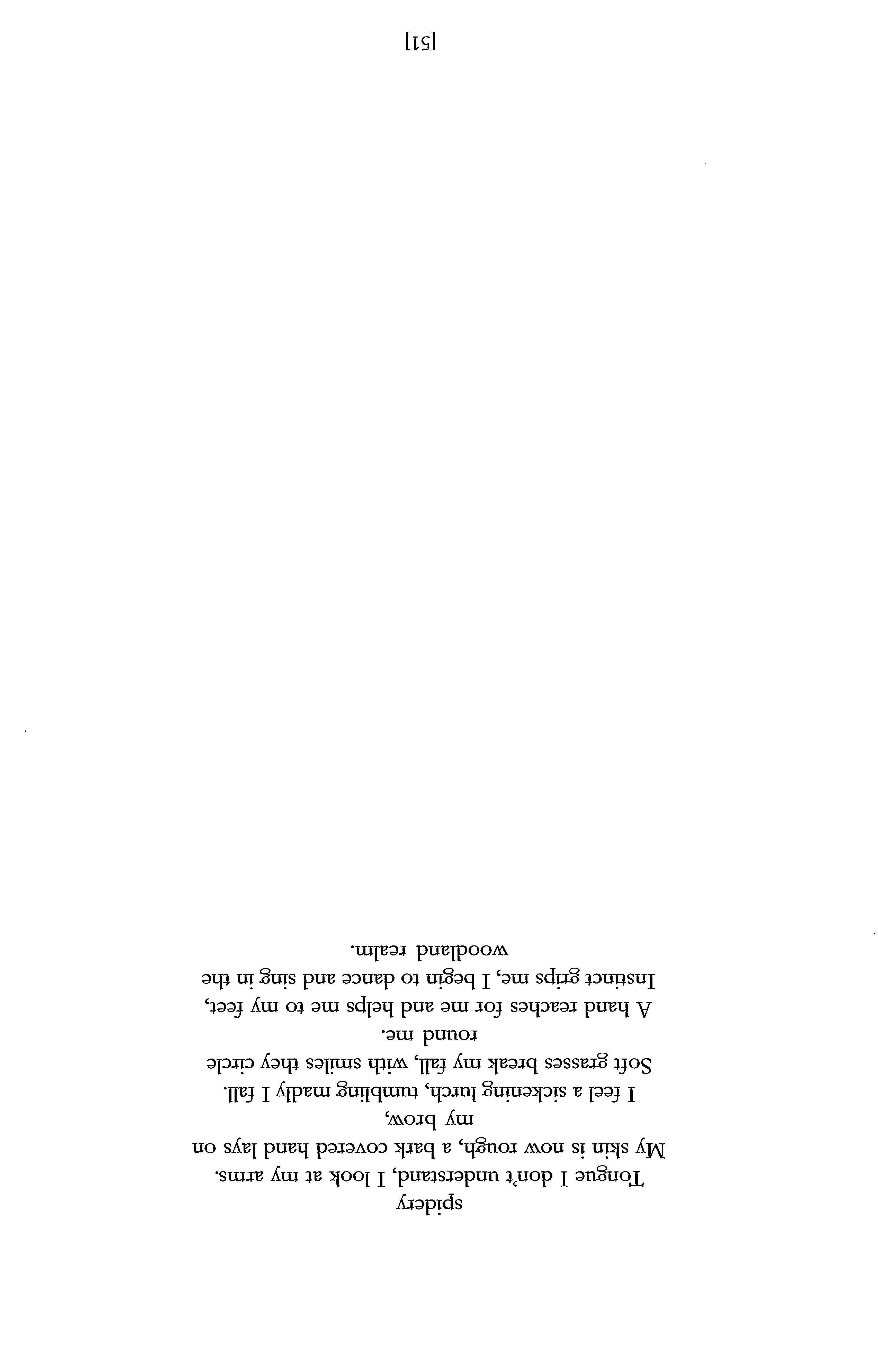
spidery
Tongue I don't understand, I look at my arms. My skin is now rough, a bark covered hand lays on my brow,
I feel a sickening lurch, tumbling madly I fall. Soft grasses break my fall, with smiles they circle round me.
A hand reaches for me and helps me to my feet, Instinct grips me, I begin to dance and sing in the woodland realm.

Beautiful Darkness
Enamored of the stars
Spiraling heavenward
Following the silvered path which glows ahead
Delving into the reel of time
Frames of the past, present and future touching in your mind
Ebony waves and scattered diamonds
Tempt you away from our humble Earthbound existence
With a wave of your hips (Independent of your torso) you cause a flush under blue eyes but now your time to fly approaches Time to make reality your dreams
Remember the night of the salt shaker
Make the neighbors go home And don't tell me to stop
The hive will try to capture
The soul of Darkness
But the illusion of the Unimatrix Won't deceive her
Universal Best friend
Guiding star, Even a mentor

Travel far as you will But always come back
To our silly blue rock and yellow star
Jacob Edge!

I am the man perched atop a dimly lit cevecheria.
Pointing a three-tiered smile at passersby. Chucking nickels at pigeons and quets at children.
I walk with arms.
It is the street and the men lying therein that are the lions leaping from my chest.
I have paid your dues
Even before they were levied against you. & now have come to coax words from the babes you've made & tame the day with nothing more than a switch and a pocketwatch.
I am the man with teargas hands.
Rubbing at my eyes.
Tugging fine French braids and plumes of smoke like lavas' reigns.
Gnawing on the night in Guat.

Sunlight falling upon me, like wind beneath my wings, give me the courage to bestow the good that kindness brings. Wrap your light around me, so that I may see the way to making friends instead of enemies, a wish for all on this day. Guide me down the path to accomplish all my dreams, never let my valor waiver as you lead me with your beams.


He's just depressed-so it seems to me.
Yet, what to say-I wonder?
Hidden between the lines-a key
To this gray storm's approaching thunder?
What a terrible blunder;
He's stopped his HIV medication. He said they turn his guts upside under When I asked for explanation.
Oh, bitter revelation.
Does he mean to end his life?
Please!-clarification-
These thoughts cut dully-a rusty knife.
Life'sfull ef endless strife;
Captive in this 3-D imprisonment;
It glares with the ryes ef an old fishwife, So I don masks ef concealment
To hide my sorrow--discouragement
With the shit-stacked at the door
It grows-magic replenishment; Shovel and shovel-there's still more.
I'm driftwood, cast upon the shore; Abandoned 01 receding tide;
Ha!f buried, bludgeoned and sore; Trapped 01 irifernal pride;

I wonder if the Buddha lied?
The path is hidden fry a haze-
Groping in darkness-hands tied.
The mandala's riddle-in a daze-
Blind-not knowing-a twisted maze. Each fork-another wrong turn to take.
Familiar words-the same familiar craze. The newest blunder-the new mistake.
Can't he see that-for pity's sake?
Say something-change his mindSomething sincere-nothing fakeYet words can fail-keys are hard to find.
Lacking foresight-in a bindNot knowing what should be said; To be stern?-to be kind?
I say the first thing that pops in my head.
Then a growing sense of dread, A flush of shame; And on that altar I am bled. Am I-somehow-to blame
For his refusal to stay in the game? It's difficult-to see.

The tide comes in washing away my castle in the sand. The kingdom I wish to stay now slipping through my hand. Waves rushing in each taking a small part, of the palace I created and hold in my heart.
My imagination so lively and true, watching my thoughts drift out into the ocean blue, fading ever so quickly or so it would seem, my castle is now a memory, but I still have the dream.


0ne of the many themes found in Ibsen's ''A Doll's House" is the marriage that is housed in the doll's house introduced in the title. We will examine this from several different views or critical theories.
First, deconstruction. If we approach it using the binaries of duty to marriage/ duty to self, we can come to no final or fixed reading. On one hand, we view Nora as sacrificing her peace of mind and economic freedom for what she views as the greater good of her husband and his health. She knew the forgery she committed was wrong, but lamented "Is it indiscreet to save your husband's life?"(1576). Her diction also indicates subservience in such phrases as ''You know I could never think of going against you" (1571) and ''Yes, whatever you say, Torvald." (1569). She does not fight Torvald's descriptions of her as his lark or squirrel and even uses his desire to please his little pet to get what she wants. The word squirrel could also connote her being a little sly or squirrelly in juggling the household money to save them from social starvation. It appears that she knows her marital role well and is only too happy to play it. She does not respond to his absolute control of her. She plays the expected role for the good of the marriage.
Deconstructionists would point out that from the beginning she sometimes favors her duty to self over duty to marriage. Despite his orders and protests, she appears extravagant. She over tips the delivery boy, brings home armloads of parcels, and partakes of the forbidden macaroons. However, we observe that this duty to self does not include being true to herself. We catch her in lies about the macaroons, the visitors, the reason for wanting Torvald to give her money for Christmas, and her promise to play with the children. In the end, of course, she fully reverses the binaries and realizes she can no longer ignore her duty to self in preference to her duty to the marriage.

The most powerful argument for a deconstructive reading may be in the word "wonderful." She first uses it to describe her home, her children and their good fortune at Torvald's promotion and their improved financial condition (1571). It is again used to describe the "wonderful" fun of being almost like a man, working and earning money (1577). But the most "wonderful" thing is the miracle she believes will happen when and if Torvald ever discovers her deceit. She assures Krogstad, "If my husband finds out, then of course he'll pay what I owe at once, and then we'd be through with you for good" (1583). She even speaks of the "wonderful joy, this waiting here for the miracle" (1602). She believes he will take the burden of it all and claim she was completely innocent. When the roof of the doll's house caves in, "wonderful" takes on a new meaning. The "wonderful" is the stunned and amazed "wonder" she is "full" of in having managed to live with and bear three children to a complete stranger. Her entire concept of marriage is deconstructed, just like the doll's house.
To appreciate the pressures Nora experienced, the play must be read from various historical views. After it opened in December of 1879, M.W Brun, a critic and theatre-manager said, "Is there one mother among thousands of mothers, one wife among thousands of wives, who could behave as Nora behaves, who would desert husband, children, and home merely in order to become 'a human being?'" Critical sympathy was almost entirely with Torvald Helmer (Baruch). In excerpts from ''A Nineteenth-Century Husband's Letter to His Wife," we understand more fully the convention of marriage at this time in history. The wife, who has left home, is told: ... you, alone, carry the guilt of all the misfortune If we want not only to be content for a day but forever, you will have to follow my wishes ... If you insist on remaining stubborn ... you will never be happy with me; your husband, children, and the entire city threaten indifference or even contempt (1627). It was simply unheard of at the time for a woman to be considered as an equal partner or human being in marriage. We see that Torvald was the powerful capitalist with money and status and Nora was only a dressed up doll/laborer, selling her labor to "live." For example, Nora's joy at having more money was in being able to "keep the house just as Torvald likes it" (1577).

This aspect of money and power, leads us to a Marxist criticism. Torvald holds the purse strings and makes all financial decisions. ''At the outset two things are clear: (1) Nora is enslaved by Torvald in economic terms, and (2) she equates personal freedom with the acquisition of wealth. Her joy at the holiday season is because Torvald's promotion means 'stacks of money and not a care in the world"' (1629). Even though she is given a household allowance, it is obvious that he expects an accounting. He several times refers to her as a spendthrift.
Being a woman made her part of a lower class. She could not have borrowed the money for the recuperative stay in Italy. ''A wife can't borrow without her husband's consent," says Mrs. Linde (1575). As a matter of fact, she doesn't even have enough authority to have access to a key for the mailbox. She was required to have her father guarantee the loan. She forged his name rather than asking for his help or troubling him on his deathbed. It appears that her creditor, Mr. Krogstad, probably knew of her deception and realized he would have great leverage by blackmailing and threatening her husband because of her indiscretion. The creditor is in a position of power. Nora isn't even sure what the balance on her loan is or how much interest she is paying. In contrast, Nora walks out the door "taking nothing" and may even be forced to return in time solely for economic reasons. The stark economic realities of the day may very well have made her "leavetaking [not] a way forward, but a cul-de-sac" (Witham 1630). We see that being a slave financially makes her a slave to Torvald's wishes and edicts.
The foregoing Marxist view of necessity incorporates the feminist view. Her sex may have been determined at birth, but her gender was a learned role which society taught her well. Today it seems inconceivable that such lopsided marital roles were the accepted norm. Witham and Lutterbie point out that "the play challenged the superstructures that had controlled and excluded the Noras of the world by manipulating their economic status and, by extension, their conscious estimation of themselves and their place in society" (1629). Ibsen has been credited with opening the dialogue on the women's question by the play's examination of the stifling influence of marriage on Nora.
The tone of the work indicates that Ibsen is challenging the status quo. He denied working for the feminist cause, but by simply recognizing Nora as a person with a right to self-determination, he

refused to accept the long-held male/ female preference.
A mythological criticism also sheds light on many aspects of this play. We have the quest: marriage itself-two human beings sharing the journey of life. However, we note that Torvald travels first class and Nora is in steerage. The destination of marital happiness is never reached, but there is a great deal of self-discovery along the way. We see Nora's obvious change from being a fluttering little plaything to a determined human being. Torvald goes along for the ride, but as the play closes we sense that he may have some desire to help create the "miracle" that might save the marriage.
The symbols are prolific and powerful. The house itself, aptly titled a doll's house, symbolizes hearth and home and happiness. This is, of course, ironic. The ironic use of the symbol is further defined by the various parts of the house. The front door (and the back door at times) introduces us to the characters that shape the Helmer couple and their marriage. It is behind Torvald's study door where he does the work he considers most important. He keeps the door closed symbolically on any kind of discussion or understanding of Nora as a real person. Nora never enters the study uninvited. It is clearly the domain of the men in the story. Torvald emerges from behind the door to check up on Nora or bark orders or fulfill his husbandly needs for her. The most significant use of the door is when she walks out the front door, opening herself to new possibilities and slamming the door on a failed marriage.
We can't ignore Ibsen's tone here. He has us rooting for Nora, despite her flightiness and shortcomings. It may be unfair, but we lay the blame all at Torvald's feet. I viewed a movie version and the tone came through in that genre as well.
We also see the game of hide and seek as symbolic. Nora is blinded to the reality of her marriage and family life. The entire marriage is actually a game of hide and seek. Nora desperately tries to keep her secret loan from Torvald; Torvald hides behind empty declarations of love and concern vowing, "I've wished you were in some terrible danger, just so I could stake my life and soul and everything, for your sake." The mask worn to the ball and the stripped down Christmas tree are also types of lost identity and hopes for Nora.
Ibsen also uses the classic themes of winter and spring. Christmas, which should be a joyful family day, is used ironically. The

winter depicts that lack of real warmth in the relationship and foreshadows the impending death of their status quo marriage. Nora innocently longs for spring and believes improved finances will lighten her burden. Dr. Rank's death is also symbolic. He wants to stay alive, no matter how miserable. Nora is doing the same thing by staying in a marriage that has no real life. Eventually, she plans to commit suicide to escape the results of her loan. Dr. Rank's relationship with Nora is much more the ideal than of Nora and her husband because she notes that he likes hearing about things that interest her.
Narratology is another way to analyze the marriage portrayed in ''A Doll's House." Briefly, the portion of narratology referred to here employs two terms. The story is the actual chronological events in the play. The discourse is how the story is presented It is materials added to the story to make it more understandable.
It is fascinating how Ibsen helps us understand the story by use of discourse. The symbols explained in the mythological section would all apply. Other added elements include the "external and internal conflicts (that) propel his plays' action." Extensive exposition explains past events that ultimately lead to the climax (1567). This comes in the form of dialogue and characterizations. These elements reveal Nora's doll-like relationship with her deceased father, Torvald's complete dominance of the marriage, and the deep friendship she shares with Dr. Rank We see clearly that Nora shares a "marriage" of mind and spirit that is absent in her "real" marriage.
The characters of Mrs. Linde and Mr. Krogstad add depth to the story. They lack the wealth, good reputation, youth, and beauty of the Helmers. However, they exhibit genuine concern for each other, honesty, willingness to forgive old hurts and begin anew, and a realization of their joint need for one another. These two "shipwrecked" souls are a perfect foil for the doll house marriage and show us very clearly the real elements of a successful relationship.
Mr. Krogstad is also used to show Nora the repercussions of her forgery. When Torvald describes a similar act committed by Krogstad, he says, "just imagine how a man with that sort of guilt in him has to lie and cheat and deceive on all sides, has to wear a mask even with the nearest and dearest he has ... Every breath the children take in is filled with the germs of something degenerate" (1586). This dramatic irony and Nora's final lines (spoken aloud to herself) at the end of Act I are compelling presentations (discourse) of the story.
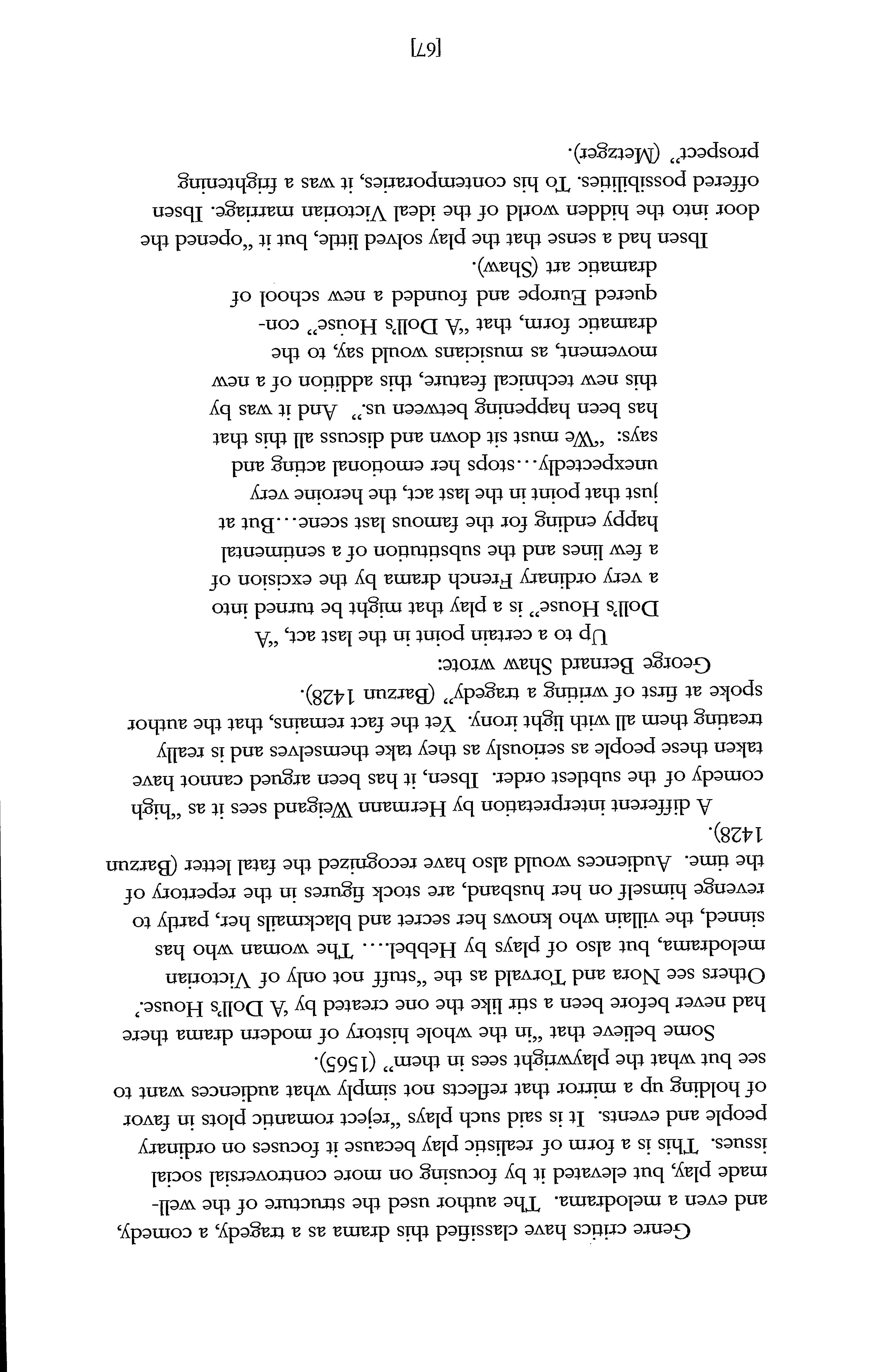
Genre critics have classified this drama as a tragedy, a comedy, and even a melodrama. The author used the structure of the wellmade play, but elevated it by focusing on more controversial social issues. This is a form of realistic play because it focuses on ordinary people and events. It is said such plays "reject romantic plots in favor of holding up a mirror that reflects not simply what audiences want to see but what the playwright sees in them" (1565).
Some believe that "in the whole history of modern drama there had never before been a stir like the one created by 'A Doll's House.' Others see Nora and Torvald as the "stuff not only of Victorian melodrama, but also of plays by Hebbel. The woman who has sinned, the villain who knows her secret and blackmails her, partly to revenge himself on her husband, are stock figures in the repertory of the time. Audiences would also have recognized the fatal letter (Barzun 1428).
A different interpretation by Hermann Weigand sees it as "high comedy of the subtlest order. Ibsen, it has been argued cannot have taken these people as seriously as they take themselves and is really treating them all with light irony. Yet the fact remains, that the author spoke at first of writing a tragedy" (Barzun 1428).
George Bernard Shaw wrote:
Up to a certain point in the last act, ''A Doll's House" is a play that might be turned into a very ordinary French drama by the excision of a few lines and the substitution of a sentimental happy ending for the famous last scene But at just that point in the last act, the heroine very unexpectedly ... stops her emotional acting and says: 'We must sit down and discuss all this that has been happening between us." And it was by this new technical feature, this addition of a new movement, as musicians would say, to the dramatic form, that "A Doll's House" conquered Europe and founded a new school of dramatic art (Shaw).
Ibsen had a sense that the play solved little, but it "opened the door into the hidden world of the ideal Victorian marriage. Ibsen offered possibilities. To his contemporaries, it was a frightening prospect" (Metzger).

My response to the play is more emotional than intellectual or political. Marriage to me is a sacred commitment of mutual trust. My personal experience has offered me personal freedom and selfexpression I'd found impossible without that total sharing of body, mind, and spirit. Because of my perspective, walking away from marriage means walking away from potential happiness.
That said, I was ready to push Nora out the door when Torvald showed how little he cared for her. Love can't be shallow words. It requires constant expressions of real concern. It might be ignoring your spouse's faults, believing in the potential no one else sees, and sometimes just manning the vacuum cleaner or lawn mower. It was apparent that Torvald's declarations of unfailing love and sacrifice were empty phrases. His fidelity was to his public appearance and social standing.
I admit to being overly optimistic, but I would hope with a little time and perspective that perhaps the "miracle" could actually occur that would allow them to truly share their lives together in the fullest extent and model the mended relationship to their children. Keep in mind, though, that I always hoped Rhett would come back and he and Scarlet could make a go of it.
In the end, the play can be interpreted as widely as marriage itself. Regardless of the style, types, or devices used, one thing is certain: "A Doll's House" continues to be a surprisingly contemporary springboard for the discussion of marriage and a woman's role within it.
Works Cited

Meyer, Michael, ed. The Bedford Introduction to Literature. 6th ed. Boston: Bedford/St. Martin's. 2001.
Shaw, George Bernard. "Technical Novelty in Ibsen's Plays." Readings on a Doll's House. Ed. Hayley R. Mitchell. San Diego: Greenhaven Press. 1999.
Witham, Barry, and John Lutterbie. ''A Marxist Approach to A Doll House." The Bedford Introduction to Literature. 6th ed. Ed. Michael Meyer. Boston: Bedford/St. Martin's. 2001.

Many issues currently debated in our society suffer from a lack of thought. All too often we find ourselves echoing the arguments of others to support or attack a position. Ironically, the one issue that could have such profound implications to our society is also the one that suffers the most from this pathological process of hollow thought. It is a curse of our culture that we habitually ground ourselves in the trenches of one side or another. Once comfortable and secure we are fearful to move from our positions in these trenches. Not only does this do a disservice to our minds, but to the intrigue that lies buried within each issue, patiently awaiting exhumation.
Capital punishment is the battlefield between these two trenches. The same weary arguments are hastily slung across the grounds from one trench to another, day in and day out. Both the abolitionists and the proponents of capital punishment approach the fight heavily armed with their Bibles, faceless statistics that support their cause, and of course, the latest list of rebuttals to launch at one another.
For a more comprehensive depiction of these metaphorical trenches, let's consider two opposing articles, both making their first appearances in the New &public in 1985. The first, entitled "Death and Justice: How Capital Punishment Affirms Life," is written by former Democratic mayor of New York, Edward I. Koch, and is a compilation of rebuttals to the seven most common arguments made by opponents of capital punishment. In defense of his position as a proponent of the death penalty, Koch first analyzes the necessity of the barbaric nature intrinsic to capital punishment, and then in his second point explains why the murder rate in the United States warrants the practice of the death penalty. Koch's third argument confronts the possibility of mistakes in our system and suggests that the potential for error should not discourage the government into a state of inaction. Koch goes on to refute the assertion that capital punishment devalues

life by stating that the implementation of the death penalty is an affirmation of our high regard for the victim's life. Furthermore, Koch contests the allegation that the application of the death penalty is discriminatory and then goes on to reinforce his position biblically and philosophically. Concluding these rebuttals, Koch contends that a government invoking the sentence of death "is no more an act of murder than is legal imprisonment an act of kidnapping" (398). Attorney David Bruck responds to Koch with an article entitled "The Death Penalty." Although each of Koch's points are not systematically addressed, Bruck's underlying thesis rivals Koch by stating "neither justice nor self-preservation demands that we kill men whom we have already imprisoned" (402). Citing specific cases, Bruck claims that the system is too encumbered with mistakes to allow the death penalty and argues against the random process in which many inmates have been selected for execution. Comparing homicide rates against statistics of execution, Bruck states that capital punishment is not a deterrent to crime nor is the attitude behind it necessary for justice. He concludes his article with the statement: "a lot of people agreed [... ] that a proper regard for justice required both lynching and the electric chair. Eventually we are going to learn that justice requires neither" (403). While I believe that both of these articles contain some elements of truth, neither of them have the capacity to persuade me either way. It seems so clear that both Koch and Bruck are speaking from the bullhorn in their suitable trenches, reading from the same dusty scripts of their comrades.
When we, as individual Americans, form our opinions on capital punishment, we use three values prominent to American culture to rationalize our decisions: morality, the sanctity of life, and justice.
Morality is, of course, that vast spectrum of right and wrong. Undeniably, morals are subject to interpretation and prove to be one of the most evolving variables our culture has endured in its short history. We all ask the question: Is it moral to take the life of another? No matter what we take into consideration as we answer this question, we must all concede that every situation is unique and that there may be more than one right answer.
Secondly, how do we, as Americans, measure the sanctity of life? What about the language in our beloved document, the Constitution of the United States? Americans search for direction in these pages much in the same manner as Christians may seek guidance in their

scriptures. "Cruel and unusual punishment'' is the phrase often cited by the abolitionists as they try to twist the Constitution into agreement with them. Their opponents are too busy in their counterattacks that most overlook the Fifth and Fourteenth Amendments. "or shall any person [ ] be deprived of life, liberty, or property without due process of law" (Article V, U.S. Constitution). While these words primarily guarantee us our rights, they also strongly imply that with due process of law, one's life, solely on a Constitutional basis, may be taken. This opinion has been upheld by the United States Supreme Court and to this day remains solid and indisputable.
Finally, we explore the value of justice. What is justice? Is it merely an emotion, or is it a process by which we balance wrong against right? If justice is a solid, definite term, then why is it so difficult to adequately define and ultimately administer justice? The distinction between justice and vengeance must be made if we expect to come to terms on the issue of capital punishment. Justice is an ideal of the American philosophy, as is liberty and freedom. Justice is perhaps best defined by juxtaposing it with the term vengeance. Indeed, vengeance may be thought of as justice's seductive sister, but their distinctions are very clear. First of all, vengeance is the urge bred by impulse to achieve inner gratification when one has been wronged. Justice, on the other hand, is a balanced and lawful process in which a specific offense is rectified. Also, vengeance breeds hatred and bitterness, while justice acts as the breath of hope for a victim and all of society. Vengeance cries for payment tenfold; justice knows when its job is done. Both have an incredible power over the human race, and I argue that although we have abandoned the medieval devices of execution, we still cling to the medieval mentality in our lust for vengeance. The very fact that the proponents of capital punishment are willing to take the life of another in the name of justice is the deepest manifestation of their desire to see justice served. But is the taking of a criminal's life a statement of justice or vengeance? If justice has the wisdom to stay its hand when its job is done, then is the practice of the death penalty a blatant act of vengeance? Or is vengeance the thorn upon the stem of justice's rose?
I wonder if Bruck, along with many other abolitionists mistake this need for justice as a mere desire for vengeance. They speak in the name of humanity and at the same time neglect to address the horrors of the victims. I suspect, however, that those crouched in the other trench, like Edward Koch, have been seduced by the hand of ven-
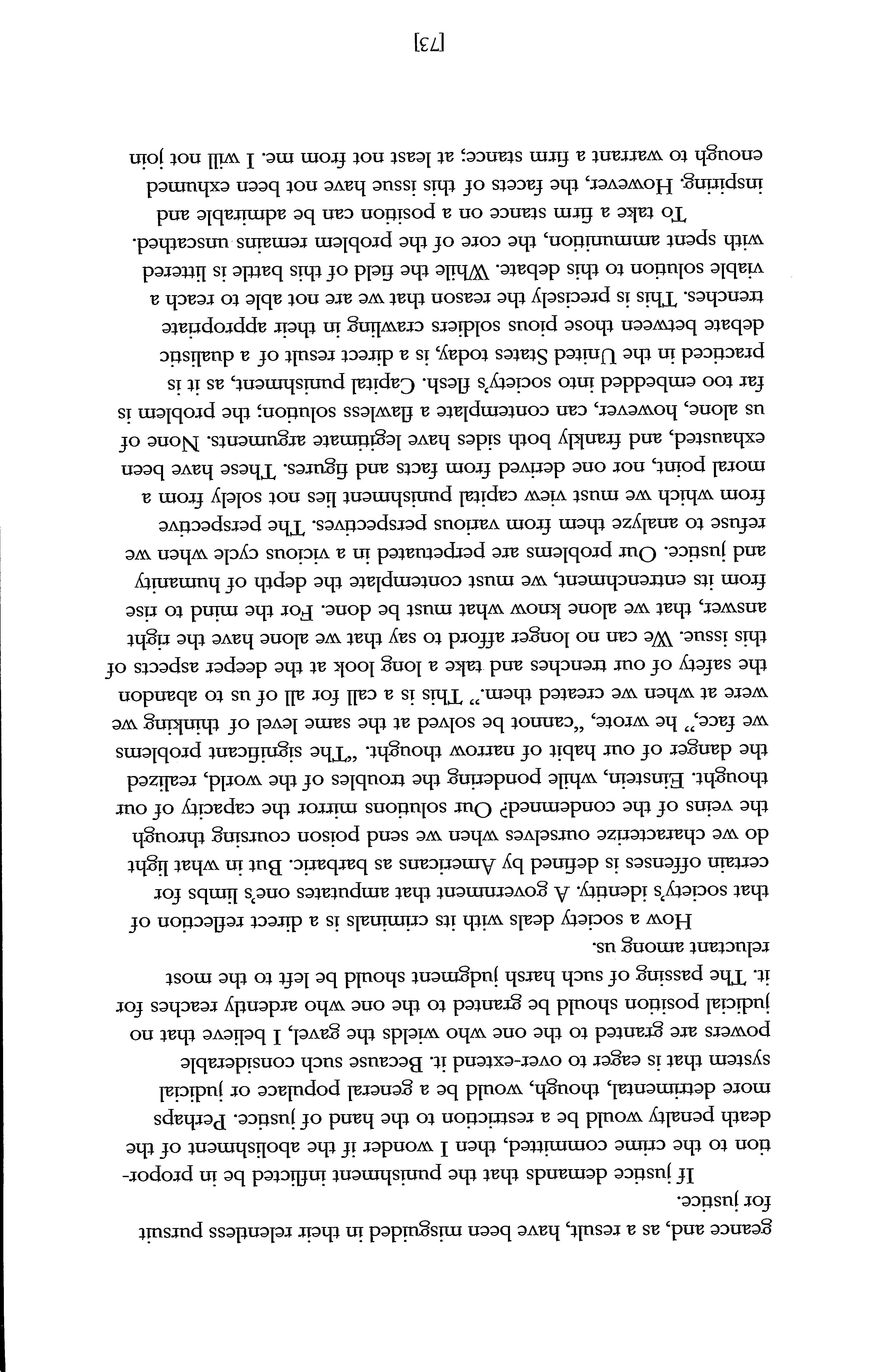
geance and, as a result, have been misguided in their relentless pursuit for justice.
If justice demands that the punishment inflicted be in proportion to the crime committed, then I wonder if the abolishment of the death penalty would be a restriction to the hand of justice. Perhaps more detrimental, though, would be a general populace or judicial system that is eager to over-extend it. Because such considerable powers are granted to the one who wields the gavel, I believe that no judicial position should be granted to the one who ardently reaches for it. The passing of such harsh judgment should be left to the most reluctant among us.
How a society deals with its criminals is a direct reflection of that society's identity. A government that amputates one's limbs for certain offenses is defined by Americans as barbaric. But in what light do we characterize ourselves when we send poison coursing through the veins of the condemned? Our solutions mirror the capacity of our thought. Einstein, while pondering the troubles of the world, realized the danger of our habit of narrow thought. ''The significant problems we face," he wrote, "cannot be solved at the same level of thinking we were at when we created them." This is a call for all of us to abandon the safety of our trenches and take a long look at the deeper aspects of this issue. We can no longer afford to say that we alone have the right answer, that we alone know what must be done. For the mind to rise from its entrenchment, we must contemplate the depth of humanity and justice. Our problems are perpetuated in a vicious cycle when we refuse to analyze them from various perspectives. The perspective from which we must view capital punishment lies not solely from a moral point, nor one derived from facts and figures. These have been exhausted, and frankly both sides have legitimate arguments. None of us alone, however, can contemplate a flawless solution; the problem is far too embedded into society's flesh. Capital punishment, as it is practiced in the United States today, is a direct result of a dualistic debate between those pious soldiers crawling in their appropriate trenches. This is precisely the reason that we are not able to reach a viable solution to this debate. While the field of this battle is littered with spent ammunition, the core of the problem remains unscathed.
To take a firm stance on a position can be admirable and inspiring. However, the facets of this issue have not been exhumed enough to warrant a firm stance; at least not from me. I will not join
the troops of either trench, for I believe the abolitionists suffer from a form of naivete disguised as humanity, and the proponents of capital punishment seem far too eager to send one's soul reeling into the realm of uncertainty. I cannot ignore the solemn finality of death, even when its mournful bell tolls for the life of a condemned killer.
So, do we sympathize with the victim or the killer? What a damnable question.

Works Cited
Koch, Edward I. "Death and Justice: How Capital Punishment Affirms Life." The Alfyn and Bacon Guide to Writing. John D. Rumage, John C. Bean, and June Johnson, 3rd Eds. New York: Longman, 2003. 394-398.
Bruck, David. "The Death Penalty." The Alfyn and Bacon Guide to Writing. John D. Rumage, John C Bean, and June Johnson. 3<<l Eds. New York: Longman, 2003. 399-403.

Do you enjoy your beliefs and thoughts being controlled by a powerful source, navigated so selectively on a specified path, and controlled so quietly and distinctively that you almost don't even notice? Many Americans are blinded by the media and press and led to believe everything they hear and see, especially during the current wartime situation. Even if the information is false or fabricated, we tend to believe the journalists and reporters that we know and trust so well. What we are given are biased opinions and fabricated truths without allowing us to draw our own conclusions based upon the truth and facts.
Some research and experience by journalists and reporters suggest that Americans were not given all the correct information about the situation in Iraq. These journalists and reporters feel that our minds were filled with advertising by the media and press of patriotism and war effort successfulness and not given an opportunity to fully see all sides of the story. Journalists who experienced this truth overseas will argue that to be the truth. Other opinions suggest that the media does a fine job in its presentation of news and gives Americans, who do or do not have all the technological access, education about worldly events and happenings. They also suggest that this type of media coverage was necessary for American culture to support the war effort. I feel that we as Americans are not given the opportunity to make our own decisions about war and foreign affairs because we are overwhelmed with advertising and hype in support of American power and domination. This only gives the majority of Americans a biased perspective, preventing us from formulating a true opinion and perspective of reality.
Author Thomas Patterson explains that news can be easily referred to as a "mirror held up to society" (293), but really only portrays a selected piece of reality. The news is a business. It wants to present stories that grab our attention and keep us intrigued. The events

that are chosen are "particularly those that are timely (new or unfolding developments rather than old or static ones), dramatic (striking developments rather than commonplace ones), and compelling (developments that arouse people's concerns and emotions as opposed to remote ones)" (293). With this we can depend on the fact that we are only going to receive the most dramatic stories knowing that the media and press have carefully planned out their presentation. This gives us an understanding of how they will catch us and draw us in. It's what sells. There is also the occurrence of the major news networks (ABC, NBC, CBS, CNN) merging with major corporate businesses. ABC, for example, is now a part of the Disney Corporation; and Time Warner now "owns" CNN. With this in mind, these news networks have had to be more in tune with the current economy and understand that they are only a small part of a larger corporation. To save costs with cutbacks, several of the major news networks have had to close news bureaus that are overseas. "This cost-saving measure placed the networks in a weak position to report accurately on global terrorism in the immediate aftermath of September 11, 2001.. ." (307). It was proven that when the attacks occurred there were no seasoned reporters in Afghanistan or Pakistan. What should we believe if we cannot rely on accurate, educated, and experienced reporting because of corporate cutbacks?
Chris Hedges is an actual wartime journalist who has had many experiences with the media coverage and wartime. His reality is quite intense. He sees that the media, press, and military "have turned the war into a vast video-arcade game. Its very essence, death, is hidden from public view ... " (Hedges 84). The actuality of this is that death is hidden from public view. We are not able to see the true hurt and pain caused to other nations by the cruelty of war. If we did, would Americans still support the unnecessary steps taken? "Nearly every war correspondent has seen his or her mission as sustaining civilian and army morale" (84). This is somewhat necessary, but what about the innocent people who are affected that need extra support. It helps for us to see that progress is being made in the war effort, but too much patriotism rather than factual reporting is what is found in the majority of all reporting by the United States.
Hedges explains "Mythic War Reporting'' (84). This is a style of reporting which I have been explaining somewhat in this paper so far. Reports are given to us in a manner that covers up the reality and truth

which is occurring. Hedges sums it up excellently as he states, "The blunders and senseless slaughter by our generals, the ruthless murder of prisoners and innocents, and the horror of wounds are rarely disclosed, at least during a mythic war, to the public" (84). Clearly he has experienced this firsthand. He has witnessed these horrifying scenes so he can accurately state the truth about mythic war reporting. This type of reporting grabs its audience and sells, sells, sells. This gives the major networks higher ratings which boost advertising and profit. True reporting does not in any way attempt to boost ratings and sell more articles. It simply relays the truth without bias and gives an accurate, REAL description of the truth.
There is also the downfall of the shock value that real reporting may entail. Could the American public handle it? Would citizens still support the war effort and the government? This could definitely have a negative impact given the sheltered exposure we have received by the media. Americans may not feel so secure that any war effort or worldly event will have a positive outcome, thus stirring up a more intense emotional response from the public. This will create even more demonstrations and strong viewpoints, which the government and media LOVE to avoid.
Edwin Diamond, a journalist and NYU professor, makes an argument that supports television and media consumption. It is true that observers who may not otherwise have any information about worldly events and happenings can gain an idea and sense of what is occurring around the nation and the world. They stay connected through their television screens, computers, and readings. "The more they watch critically-and read, converse, and think-the more they are engaged in life and politics and society" (98). This can give everyone some sort of feel for what is happening and maybe encourage further education, questioning, and research.
With the current war situation we are experiencing, many, many views and opinions which conflated into a mess of conservative to liberal, and correct to incorrect reporting and coverage. Reid Emil describes some factual occurrences with Left criticism, which includes Americans as well as foreign journalists who "found the U.S. media maddeningly patriotic and unwilling to question the basic premises of war" (62). The Right supported and praised the reporting, especially by FOX and CBS, for showing the success of the U.S. war effort. Success stories are necessary because, number one, loved ones are

stationed in these countries of conflict, and families and friends waiting and wondering need to be given some hope. Number two, we need to feel something is going right. I have many friends with family members who were or are currently involved overseas in wartime conflict. To see the pain in their eyes, as well as experiencing my own fear of loved ones being hurt, is overwhelming and scary.
Are we given the correct information of what is really going on and what is the cause or reasoning behind what is occurring? Are we educated by the networks and media on the U.S.'s economic interest and agenda that really pushes the "Big Brother" conquest to control the Middle East? "Once 'Operation Iraqi Freedom' became the theme, in the now familiar style of code names that double as advertising slogans, the networks treated that as if it had been the point of the enterprise all along" (Carson and Kaye, 34). This "theme" sucked in Americans and gave us reason to believe that everything that was occurring was for the good of the Iraqis when they were experiencing nothing but turmoil and pressure to adapt to a style of government which they are not even close to accustomed to. Let's not forget the culture change that is being forced on these people as well. Is that fair play? Is the media giving us this information on the unnecessary pain and suffering experienced by the Iraqi people? Most American journalists present us to be the top dog and savior of these persecuted people, but do not even consider that they may not want to conform.
As an American citizen I have wanted to support our efforts with worldly events, always thinking we were in for the best interest of their people. But as I have witnessed, researched, and studied I have come to find out that their best interests are not considered. The best interest is for the United States and mainly our economy. It seems as if there may be a "control" issue or complete dominance, which can easily backfire in many negative ways.

Works Cited
Patterson, Thomas E. The American Democrary. Boston: McGrawHill, 2003.
Hedges, Chris "In War, Journalists Become Part of the Problem." Neiman R.eports Summer 2003: 84-86.
Diamond, Edwin. Good News, Bad News. Cambridge, Massachusetts: The MIT Press, 1978.
Emil, Reid. "War Coverage That Angered Everyone." World & I Nov. 2003. MasterFIIE Premier. EBSCO Publishing. Markosian Llb., SLCC. 12 Nov 2003 http://www.epnet.com
Carson, Tom and Kaye, Chris. "COLLATERAL DAMAGE War coverage to make a good American proud." Esquire Jul. 2003. MasterFILE Premier. EBSCO Publishing. Markosian Llb., SLCC. 12 Nov 2003 http:/ /www.epnet.com.

This is a seven-year collection of unbelievable true stories, amazing confessions, unbridled passion, the darkest and kindest of human behaviors in Salt Lake City, Utah. This is a sample ef the author} collection.
I received another order at an office building. It was a man that flew on a jet clear out here from Wisconsin to see an executive. The executive had quit his job the day before and didn't bother to notify him, so the man had flown clear out here for nothing. I was driving him back to the airport when he told me this story of what happened to him in a New York cab. He said, "I was late for a meeting when we drove up on a truck blocking the road, unloading fish. We had no where else to go but up ahead past the truck because cars were backed up behind us. The cab driver got out of the cab and started yelling at the truck driver unloading fish, telling him to move his truck. Then the truck driver told him to go to hell. The next thing I know, the cab driver and the truck driver were going at it in a fist fight. They started out punching each other in the head. I was already late for my meeting and the taxi cab meter was still running, so I put the thirty five dollars on the seat and got out. I walked around them both rolling on the ground and caught another cab on the other side of the truck."
I had a guy coming from New York. He told me what happened to him at the bus station there. A guy dressed up like he worked at the bus station asked him if he could carry his luggage to a cab for him. He told him sure, but to his surprise the phony baggage handler kept walking with the luggage almost up to a full block, until a Yellow Taxi cab came down the road, slammed on his brakes and hopped out and yelled, "Do you want a cab?" That's when the guy dropped the

luggage and ran off. Then the cab driver asked the bewildered traveler if he wanted a ride. "Of course," he said. When all the luggage was loaded in the Yellow Cab, the driver told him how lucky he was because the guy that was carrying his luggage was about to walk him into a back alley and mug him and take his luggage. He told the cab driver he thought something was wrong, but was too frightend to say anything at the time. The cab driver told him he saw what was being pulled on him so that's why he slammed on his brakes. Before I dropped this guy off he told me that he tipped the yellow cab driver forty-dollars for saving his luggage and possibly his life. I told him that I once received a forty-dollar tip for being a hero too.
Sometimes you wait years before you get a good customer who needs to go really far. This was one of them times. I got a call to pick up a customer at the Amtrak Station. This is usually about a three dollar fare to one of the hotels but not this time. It was the best fare I've had in three years. When I got to the Amtrak Station there was a young man there who looked very upset. When he got into my cab he told me how he was supposed to be on an bus to Ogden, which wasn't scheduled to leave for another fifteen minutes. The bus driver lied to him and took off with his luggage while he was getting something to eat. The young man asked me how much to Ogden. "Sixty-two dollars," I replied. "Lets go," he said, "I need my luggage off that bus, and have to get there in time to catch my train to Oregon. I drove as fast as I could, sometimes twenty-miles an hour over the speed limit. I thought to myself how upset I would be if I were him. I also would like to thank the police for not stopping me. It's just too bad about the cars that followed me at that speed that were pulled over by police. But I am glad to say we caught the bus just before it left, and he made his train to Oregon.
This one is a classic. The next people I picked up in my cab told me about an experience they had the day before while taking a cab. When they walked out of a restaurant to get in their cab they saw a drunk man leaning on their cab talking to the driver. They assumed that he was a friend of the cab driver's, and the cab driver assumed that he was with them. They all got in the cab and drove for a couple of miles

when the drunk man says, "Pull the cab over here and let me out. They'll take care of it." Then he staggered away. This caused them to have to pay for the drunk man's cab fare on top of their own.
This is a story told to me by a truck driver who got mugged twice in a matter of minutes while walking back to his truck. It happened in New York City. He told me that he had been driving for twelve hours when he got lost somewhere in a bad part of town. He knew better than to use a pay phone in that area. When he was through calling on the phone, he noticed a man running around behind his truck. When he started walking toward his truck, the man stepped out from the opposite side of the truck with a small gun and told him to freeze. Then the mugger's partner stepped around from behind the truck with a bigger gun and took him up against a wall back where the pay phone was and frisked him like the cops do. They took the eighty dollars out of his wallet and left him. He then started walking back toward his truck when another man stepped out to mug him, but this time he yelled, 'Heyl Your buddies just took all I had. I don't have anymore." And he jumped in his truck and took off.
I picked a man up at his house, and he told me he needed to go to the University to pick up his check. The man was a maintenance man at the University. His check, in the sum of three thousand dollars, was for three years worth of unused vacations days. He said he was never able to get his work caught up. I asked him if he was going to spend the check on Christmas gifts. He answered, "No! I'm going to Wendover, Nevada to gamble." "Oh! Good luck," I said. "I hope you don't lose it all there." He said, ''I'm not that stupid. I'm only taking a couple hundred dollars. The rest is going in the bank." He needed to go to several different places after he cashed his check. As time went by I told him I was writing a book. He said, 'So am I." "Oh great," I said, "what is it about?" "It's about a UFO that is in love with me;' he replied. I said, ''What?" ''You heard me; a UFO that's in love with me." "Right," I said. ''It's true! It's in my back yard, and one night I didn't wave to it in the sky so it blew up my TV and VCR." ''Wait a minute," I said. "There's a UFO in your back yard?" ''Yep! There is, and it looks just like a star in the sky. I discovered it

while looking for a meteoroid one night. Suddenly it started moving for me, and it knew I was looking at it, and it can read my mind." I said, "Hmm. You forgot to wave to it one night. Does that mean it's there every night?" ''Yeah," he stated. I said."It is starting to get dark out now. I must see this star move for you." He said, " that would be great." We pulled into his driveway and walked to the backyard. There was the star, right where he said it would be. I stood completely still while staring at the star to see if it would move. I said to him, "The star is not moving." He replied, "It just won't move for some people." I stood there looking up at that star like a gullible fool hoping it would move, before I took him down town to catch his bus to Wendover.
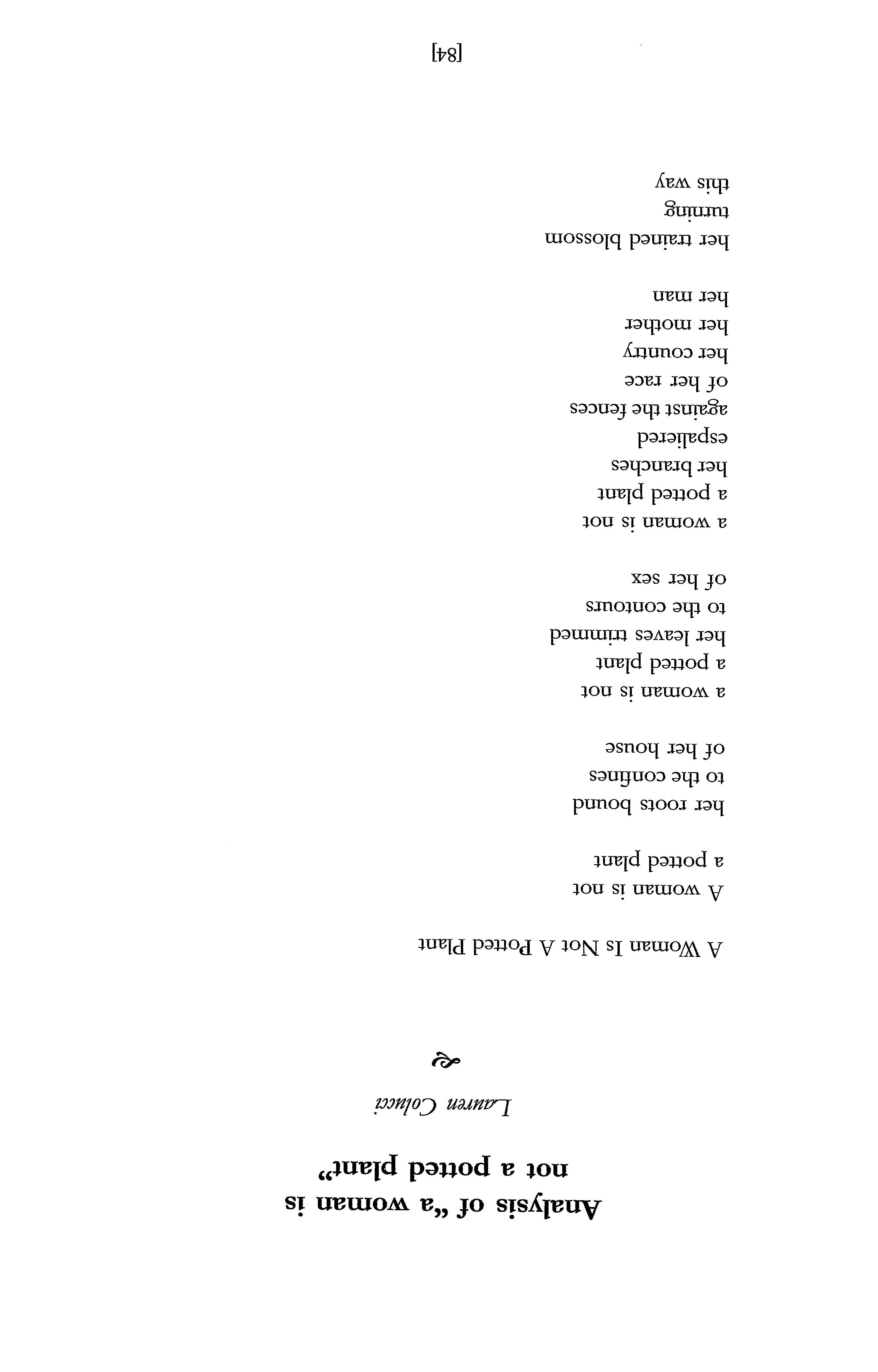
A woman is not a potted plant
her roots bound to the confines of her house
a woman is not a potted plant her leaves trimmed to the contours of her sex
a woman is not a potted plant her branches espaliered against the fences of her race her country her mother her man her trained blossom turning this way

&that to follow the sun of whoever feeds and waters her a woman is wilderness unbounded holding the future between each breath walking the earth only because she is free and not creepervine or tree.
Not even honeysuckle or bee.
-Alice WalkerAlice Walker's poem, "a woman is not a potted plant,"can be considered poetry because it creates a new way in which to view women. It is a feminist critique of the subjugated roles in which society has placed women. Walker uses the comparison of the treatment of potted plants to society's shortcomings in their categorizations and expectancies of women. Women are not merely wives or mothers. They should not be expected to change their appearance in order to please others nor should they be summarized by their race or nationality. Using various literary devices, Walker makes a valid point in this poem that women are complex, capable, and very much equal to men.
One aspect of the poem, which emphasizes the theme of equality in this poem, is the lack of punctuation. It is clearly not an oversight by Walker, but is instead an equation of punctuation to the confines of society. Social roles limit women's behavior, as punctuation similarly limits an author to having to designate pauses and breaks. By dismissing punctuation in the poem, Walker is also dismissing society's rules.
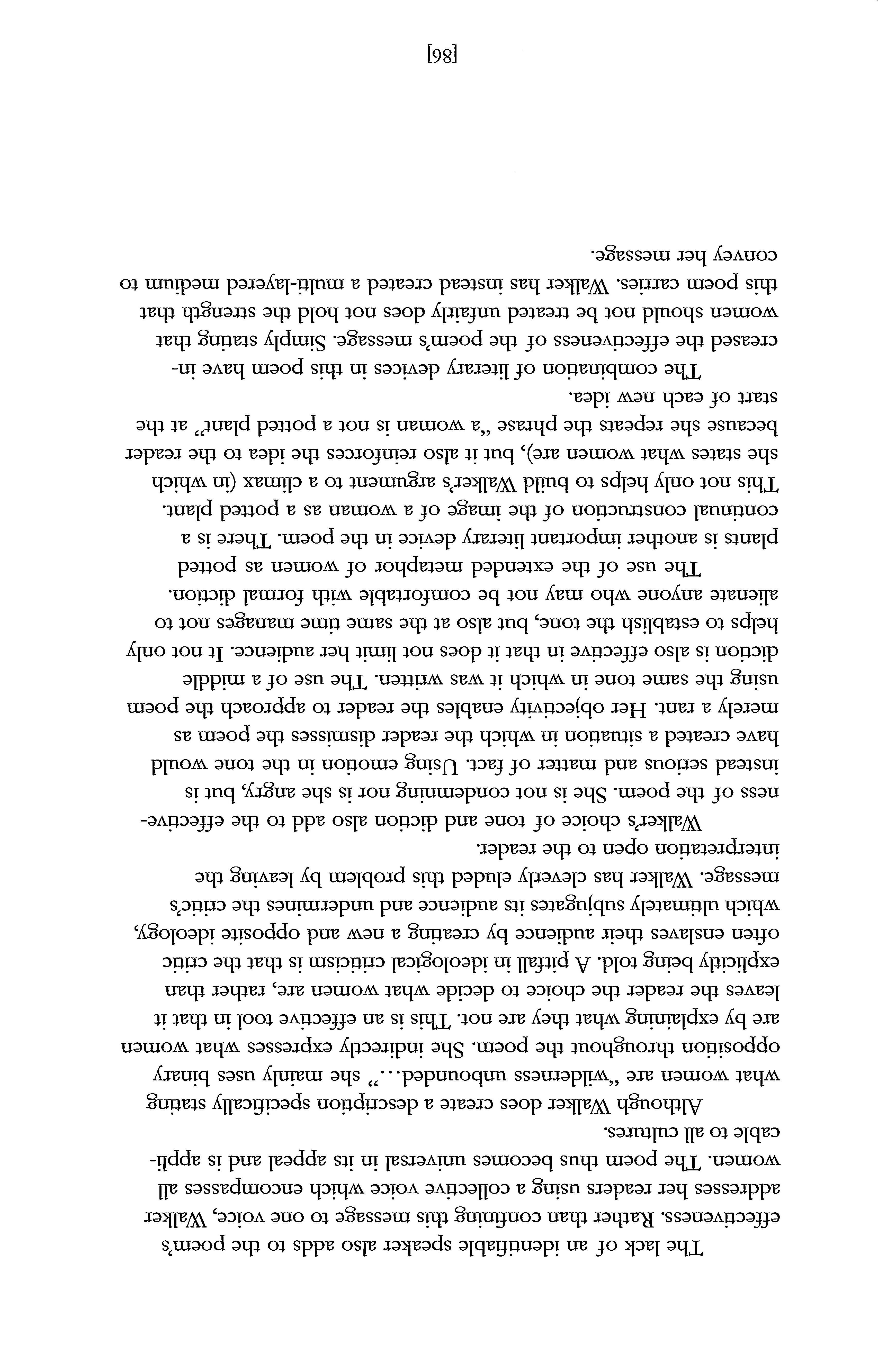
The lack of an identifiable speaker also adds to the poem's effectiveness. Rather than confining this message to one voice, Walker addresses her readers using a collective voice which encompasses all women. The poem thus becomes universal in its appeal and is applicable to all cultures.
Although Walker does create a description specifically stating what women are "wilderness unbounded ... " she mainly uses binary opposition throughout the poem. She indirectly expresses what women are by explaining what they are not. This is an effective tool in that it leaves the reader the choice to decide what women are, rather than explicitly being told. A pitfall in ideological criticism is that the critic often enslaves their audience by creating a new and opposite ideology, which ultimately subjugates its audience and undermines the critic's message. Walker has cleverly eluded this problem by leaving the interpretation open to the reader.
Walker's choice of tone and diction also add to the effectiveness of the poem. She is not condemning nor is she angry, but is instead serious and matter of fact. Using emotion in the tone would have created a situation in which the reader dismisses the poem as merely a rant. Her objectivity enables the reader to approach the poem using the same tone in which it was written. The use of a middle diction is also effective in that it does not limit her audience. It not only helps to establish the tone, but also at the same time manages not to alienate anyone who may not be comfortable with formal diction.
The use of the extended metaphor of women as potted plants is another important literary device in the poem. There is a continual construction of the image of a woman as a potted plant. This not only helps to build Walker's argument to a climax (in which she states what women are), but it also reinforces the idea to the reader because she repeats the phrase "a woman is not a potted plant" at the start of each new idea.
The combination of literary devices in this poem have increased the effectiveness of the poem's message. Simply stating that women should not be treated unfairly does not hold the strength that this poem carries. Walker has instead created a multi-layered medium to convey her message.
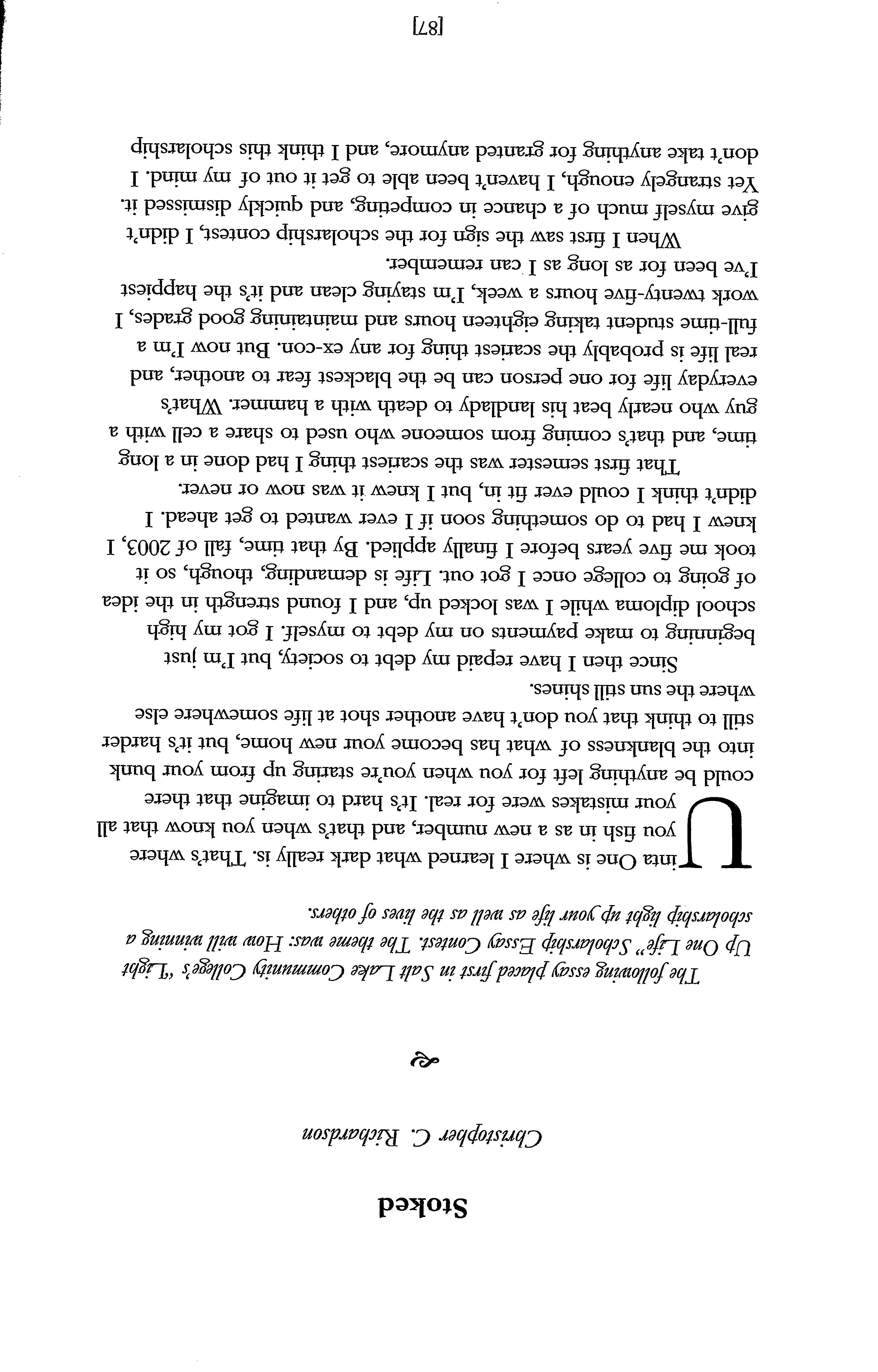
The following essqy placedfirst in Salt Lake Community College's "Light Up One Life" Scholarship Essqy Contest. The theme was: How will winning a scholarship light up your life as well as the lives ef others.
Uinta One is where I learned what dark really is. That's where you fish in as a new number, and that's when you know that all your mistakes were for real. It's hard to imagine that there could be anything left for you when you're staring up from your bunk into the blankness of what has become your new home, but it's harder still to think that you don't have another shot at life somewhere else where the sun still shines.
Since then I have repaid my debt to society, but I'm just beginning to make payments on my debt to myself. I got my high school diploma while I was locked up, and I found strength in the idea of going to college once I got out. Life is demanding, though, so it took me five years before I finally applied. By that time, fall of 2003, I knew I had to do something soon if I ever wanted to get ahead. I didn't think I could ever fit in, but I knew it was now or never.
That first semester was the scariest thing I had done in a long time, and that's coming from someone who used to share a cell with a guy who nearly beat his landlady to death with a hammer. What's everyday life for one person can be the blackest fear to another, and real life is probably the scariest thing for any ex-con. But now I'm a full-time student taking eighteen hours and maintaining good grades, I work twenty-five hours a week, I'm staying clean and it's the happiest I've been for as long as I can remember.
When I first saw the sign for the scholarship contest, I didn't give myself much of a chance in competing, and quickly dismissed it. Yet strangely enough, I haven't been able to get it out of my mind. I don't take anything for granted anymore, and I think this scholarship
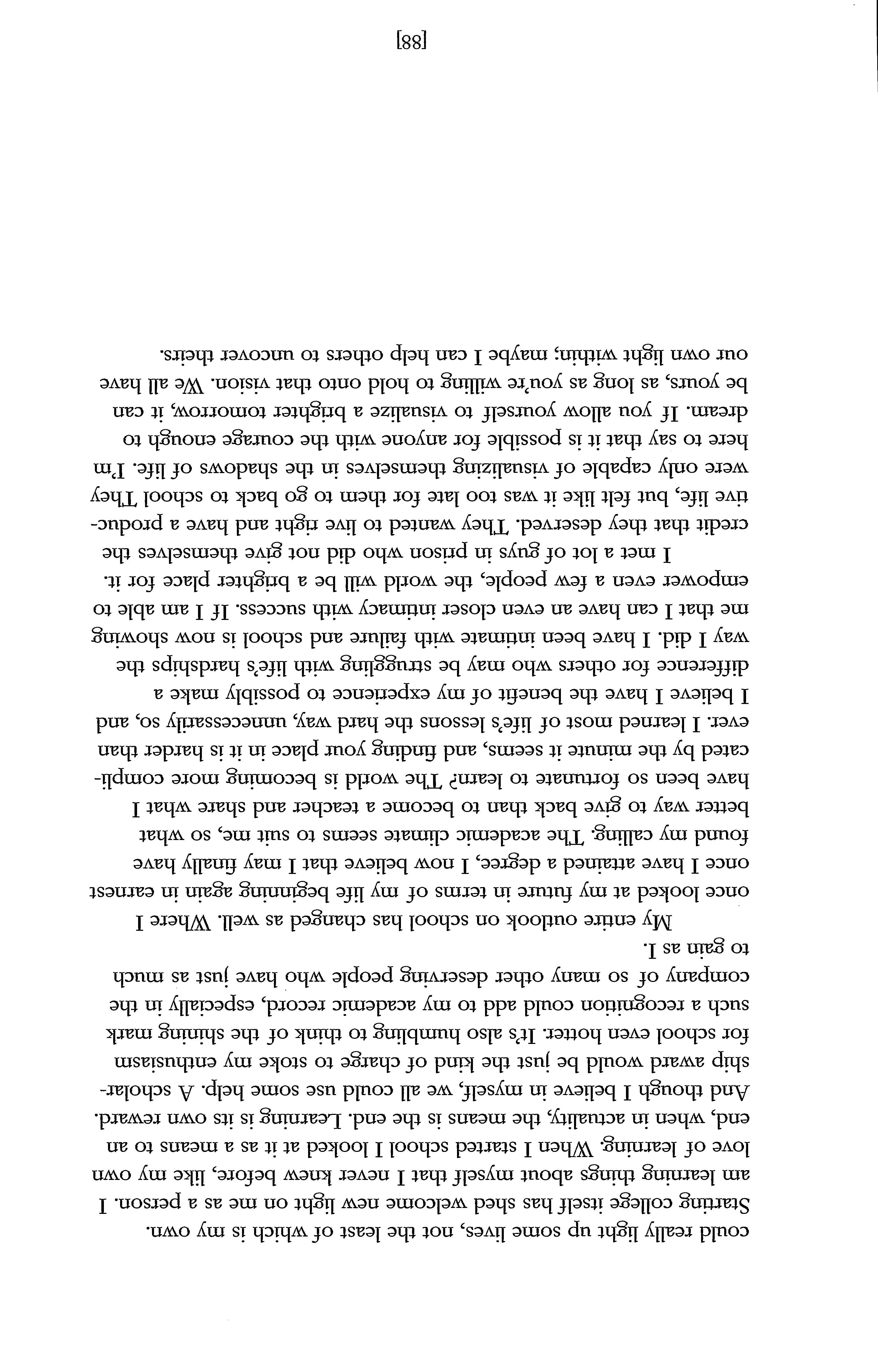
could really light up some lives, not the least of which is my own.
Starting college itself has shed welcome new light on me as a person. I am learning things about myself that I never knew before, like my own love of learning. When I started school I looked at it as a means to an end, when in actuality, the means is the end. Learning is its own reward. And though I believe in myself, we all could use some help. A scholarship award would be just the kind of charge to stoke my enthusiasm for school even hotter. It's also humbling to think of the shining mark such a recognition could add to my academic record, especially in the company of so many other deserving people who have just as much to gain as I.
My entire outlook on school has changed as well. Where I once looked at my future in terms of my life beginning again in earnest once I have attained a degree, I now believe that I may finally have found my calling. The academic climate seems to suit me, so what better way to give back than to become a teacher and share what I have been so fortunate to learn? The world is becoming more complicated by the minute it seems, and finding your place in it is harder than ever. I learned most of life's lessons the hard way, unnecessarily so, and I believe I have the benefit of my experience to possibly make a difference for others who may be struggling with life's hardships the way I did. I have been intimate with failure and school is now showing me that I can have an even closer intimacy with success. If I am able to empower even a few people, the world will be a brighter place for it.
I met a lot of guys in prison who did not give themselves the credit that they deserved. They wanted to live right and have a productive life, but felt like it was too late for them to go back to school They were only capable of visualizing themselves in the shadows of life. I'm here to say that it is possible for anyone with the courage enough to dream. If you allow yourself to visualize a brighter tomorrow, it can be yours, as long as you're willing to hold onto that vision. We all have our own light within; maybe I can help others to uncover theirs.
